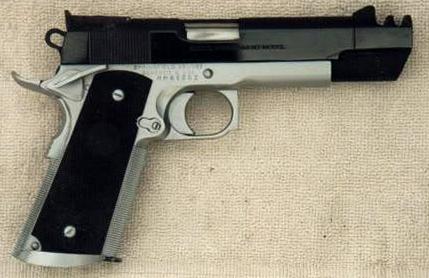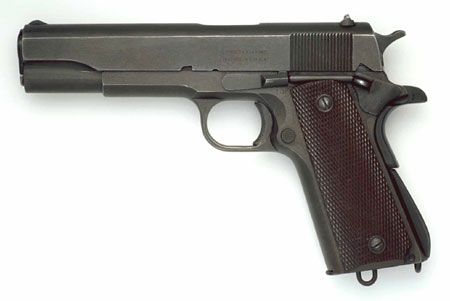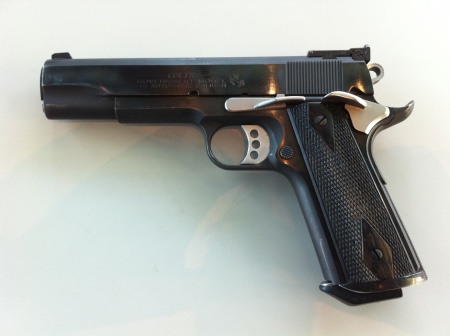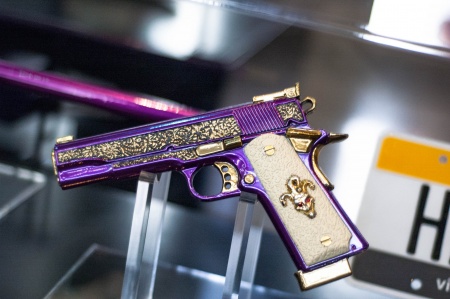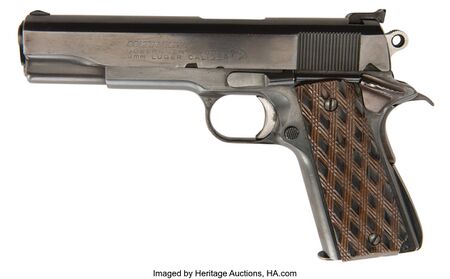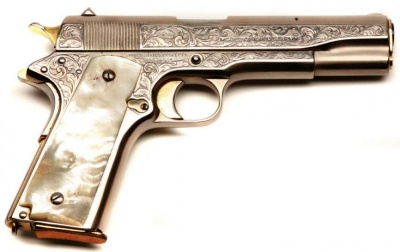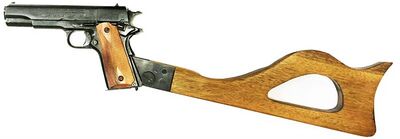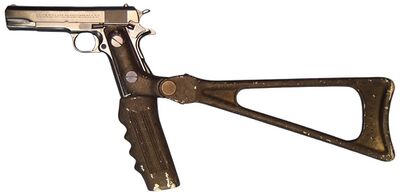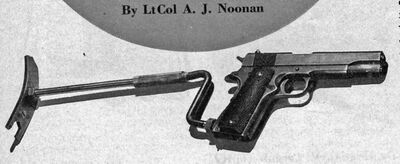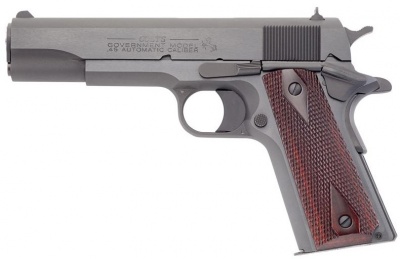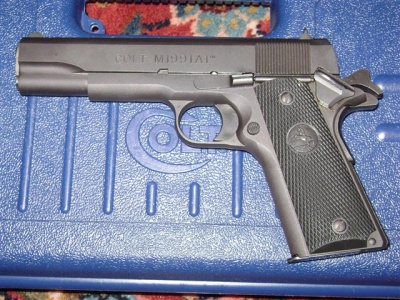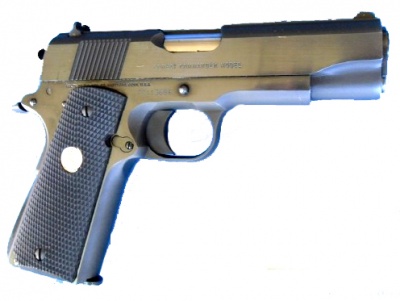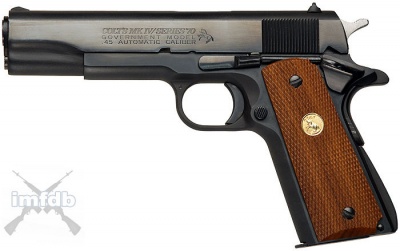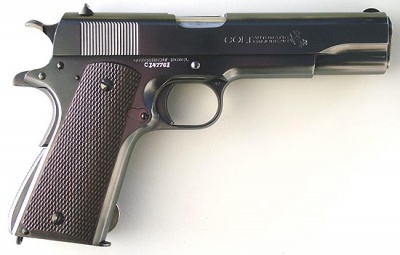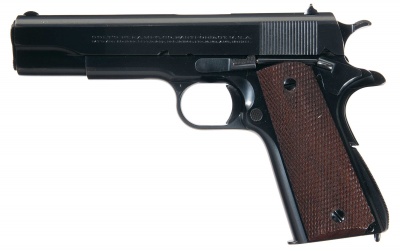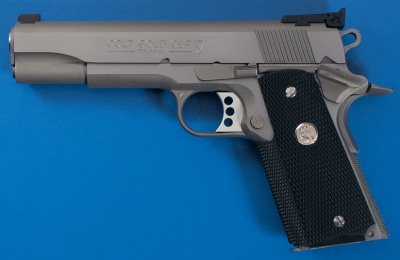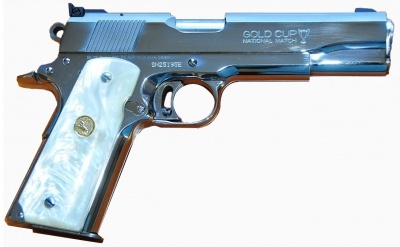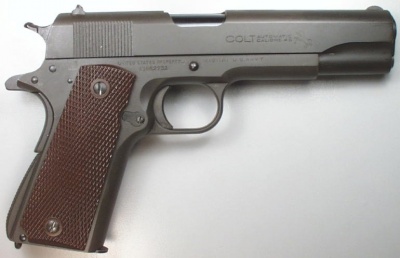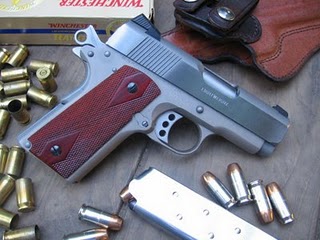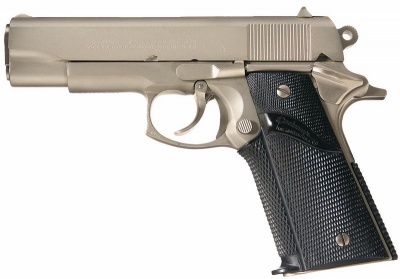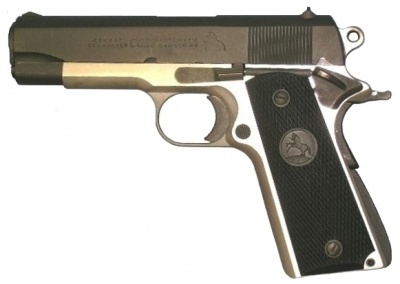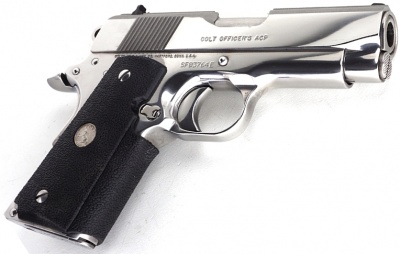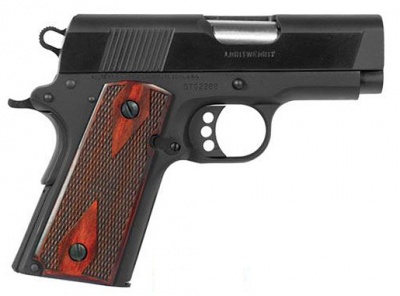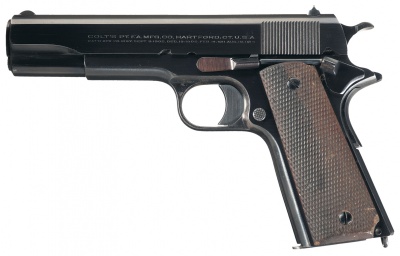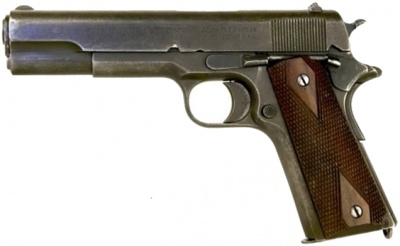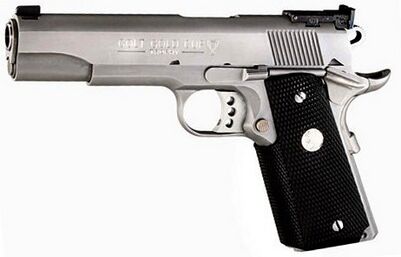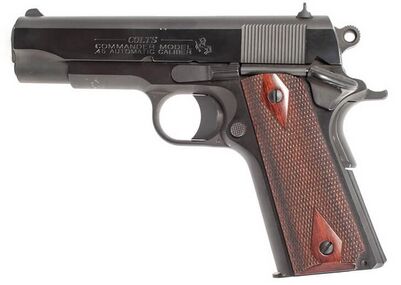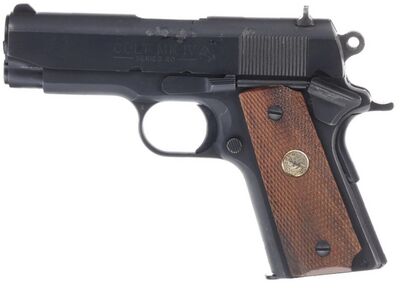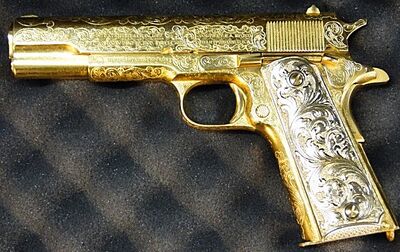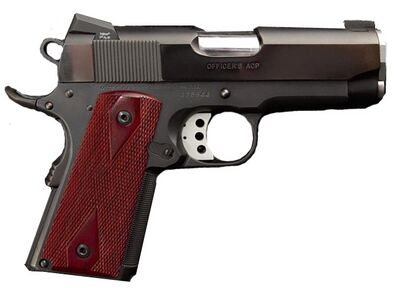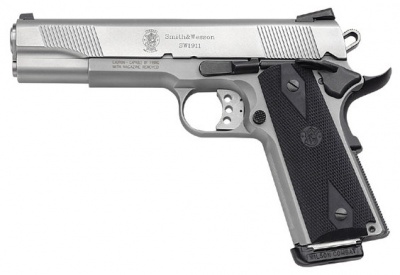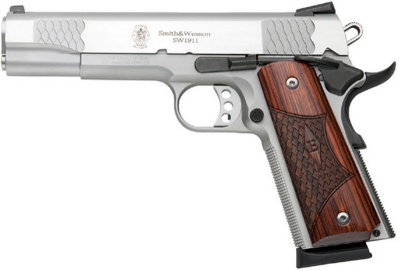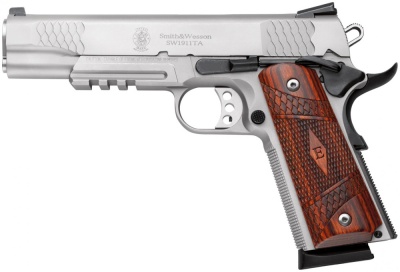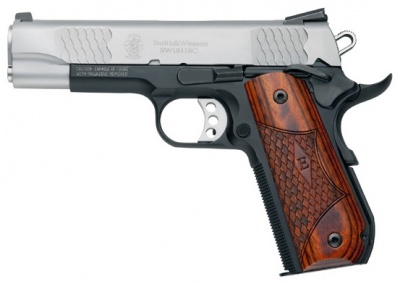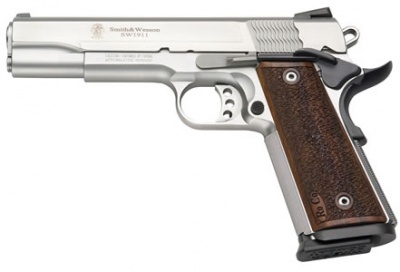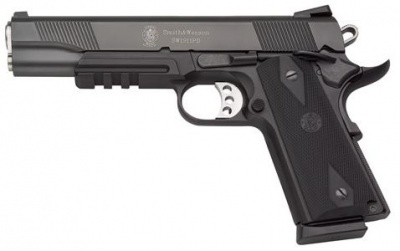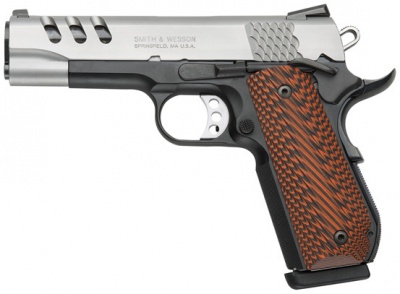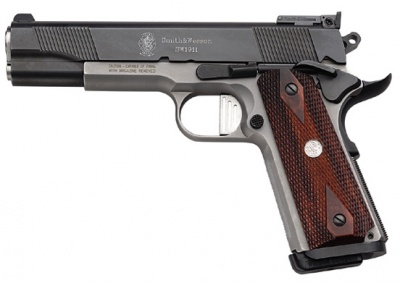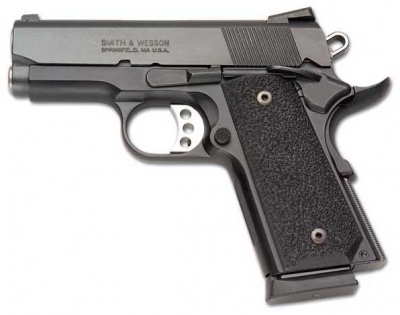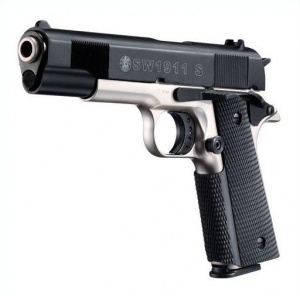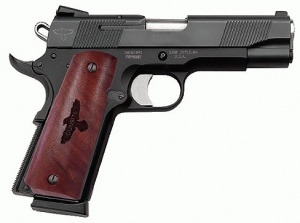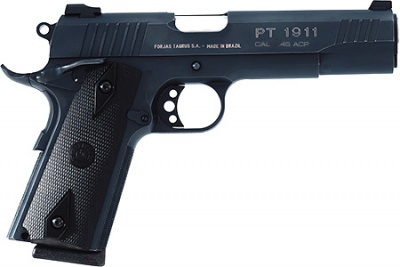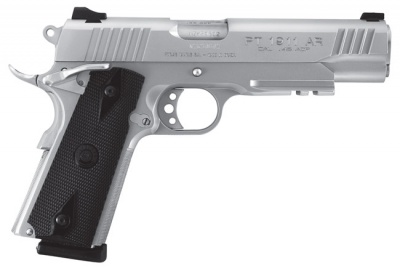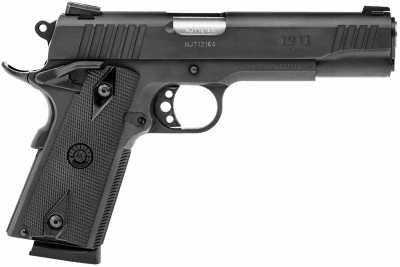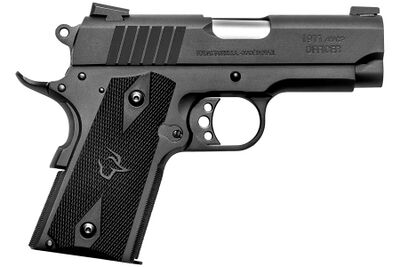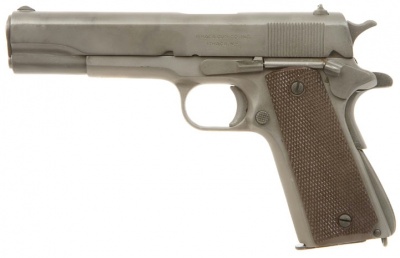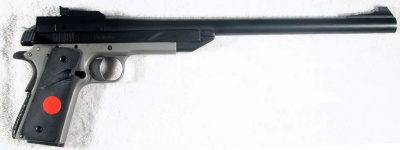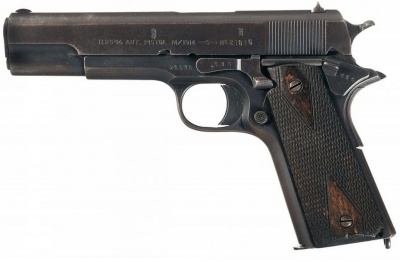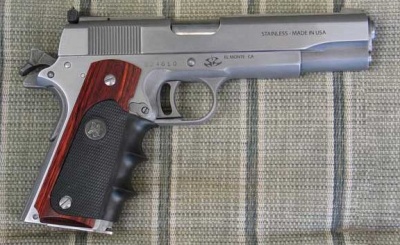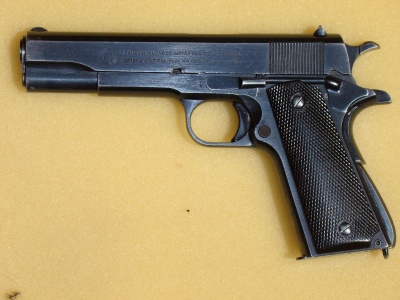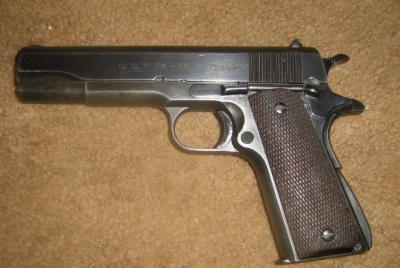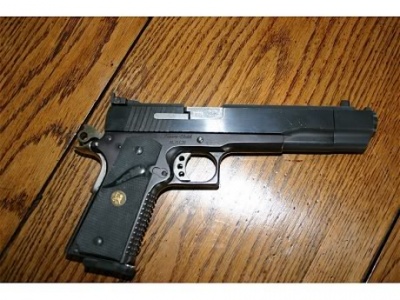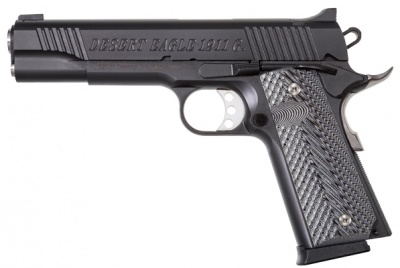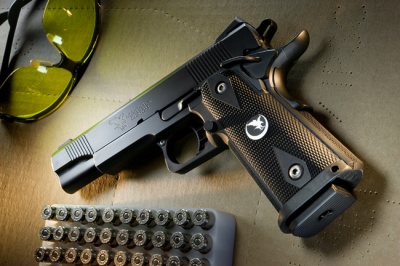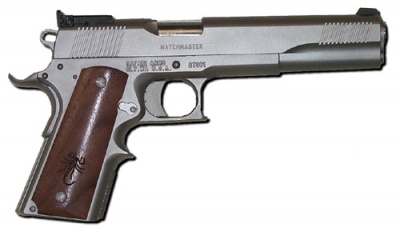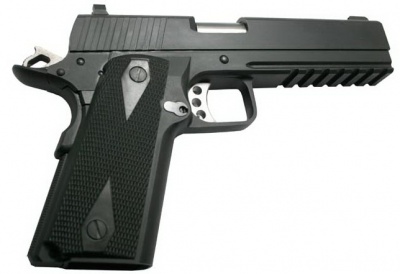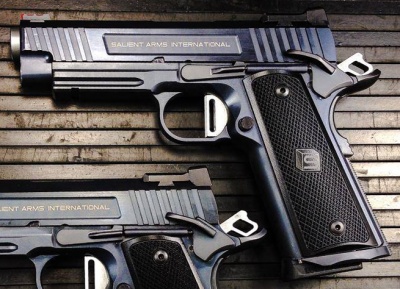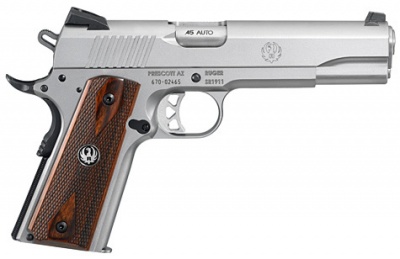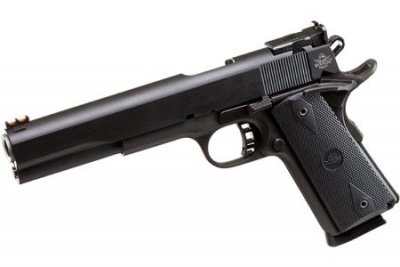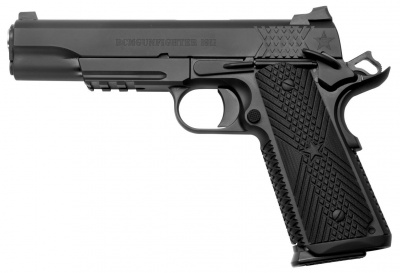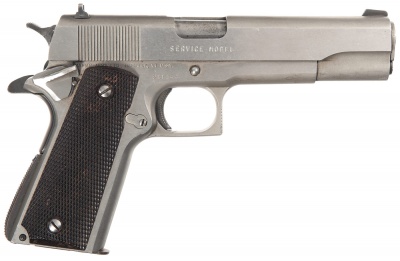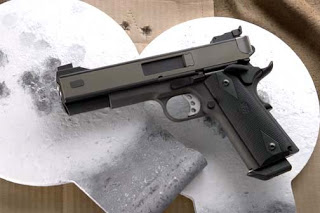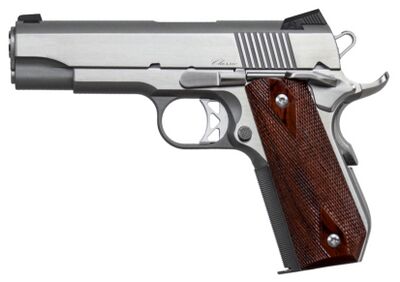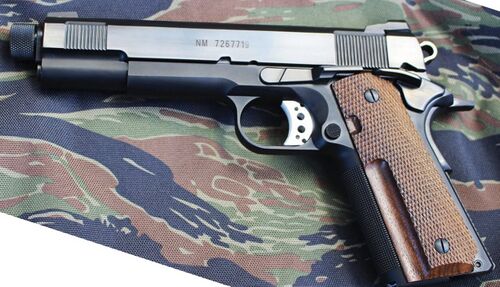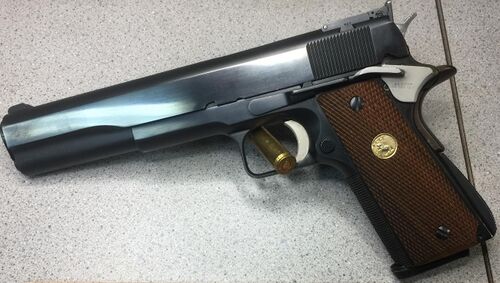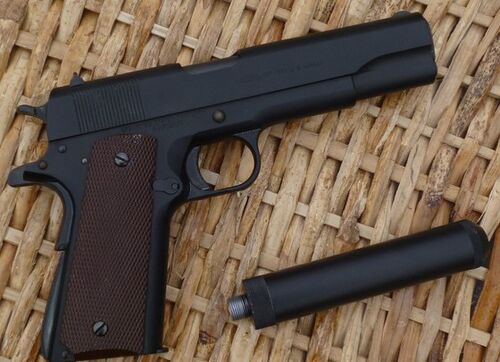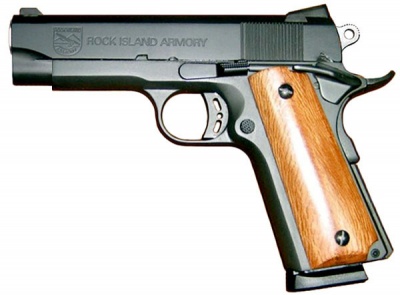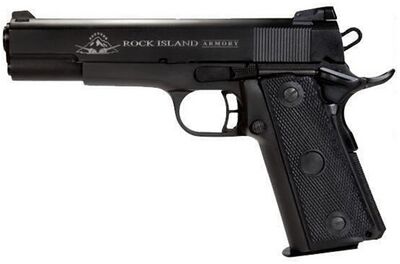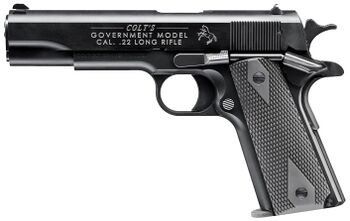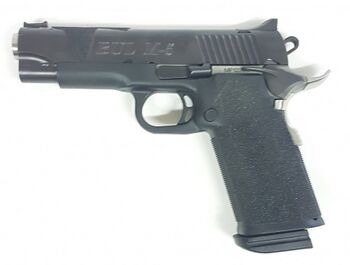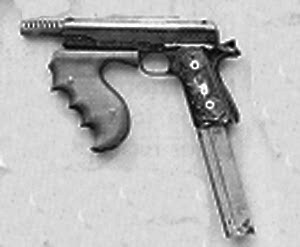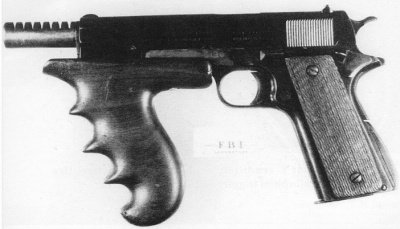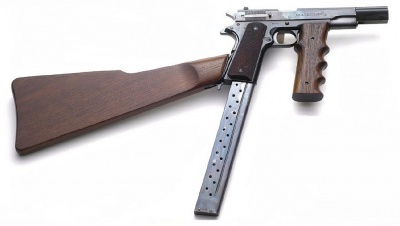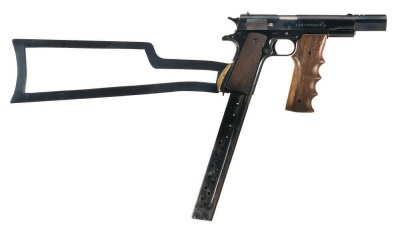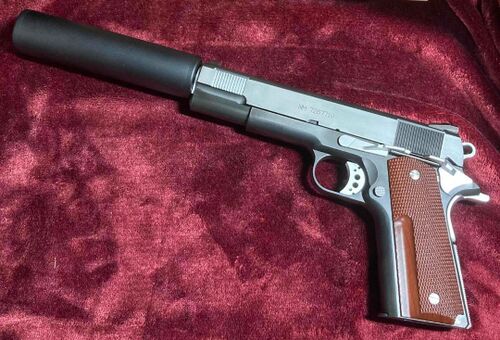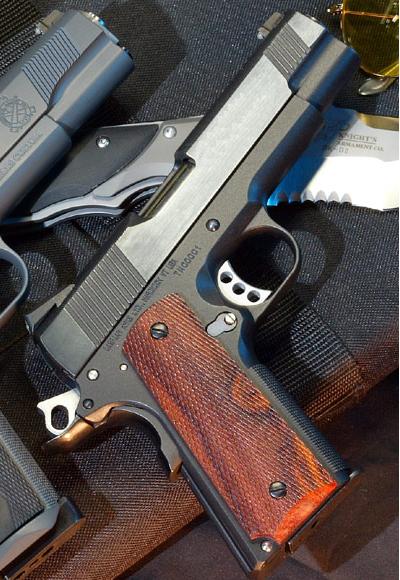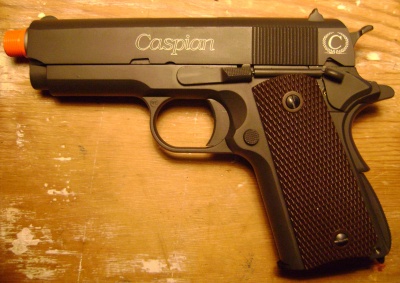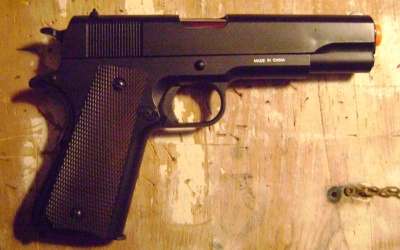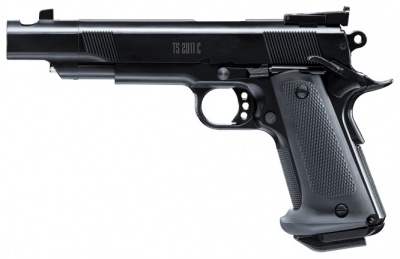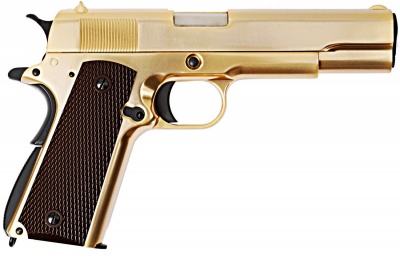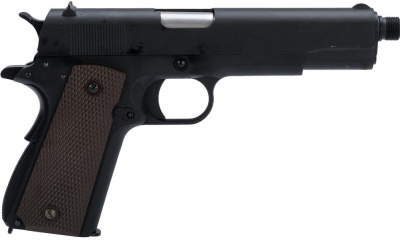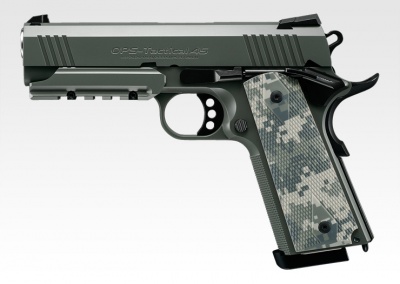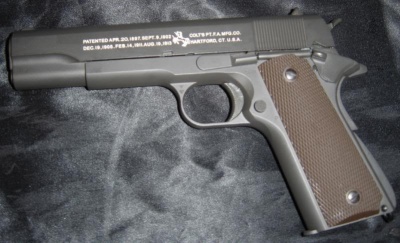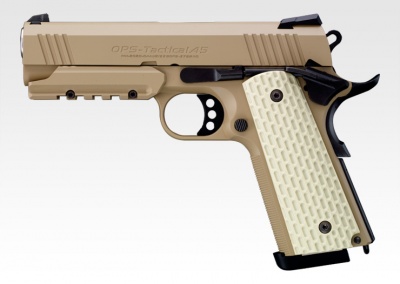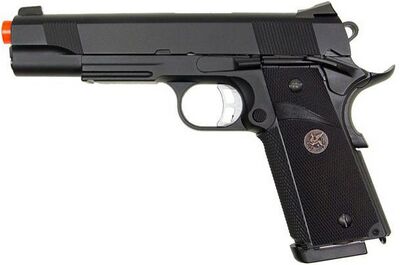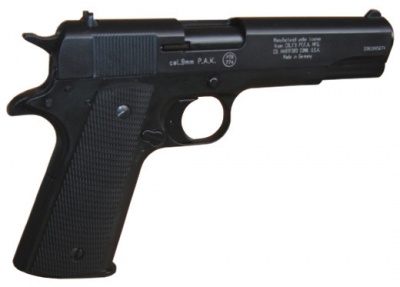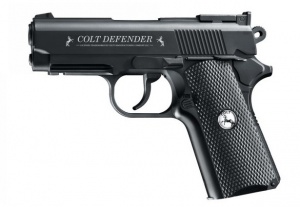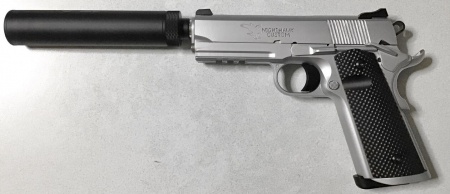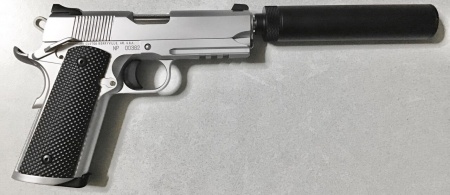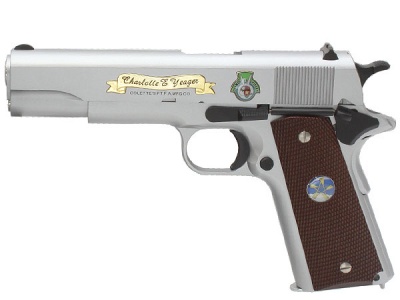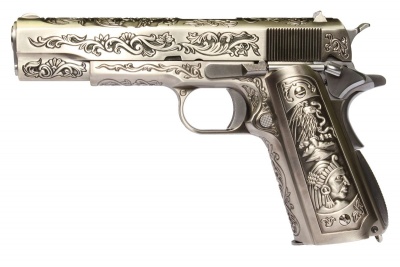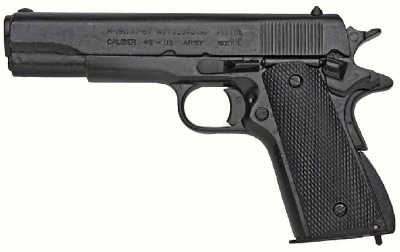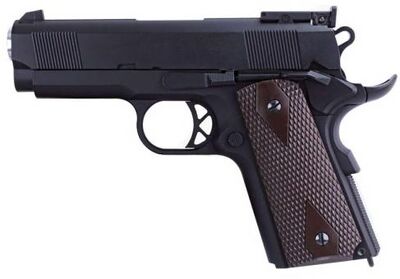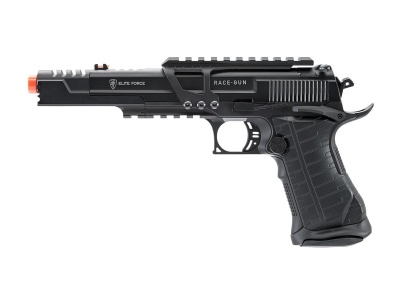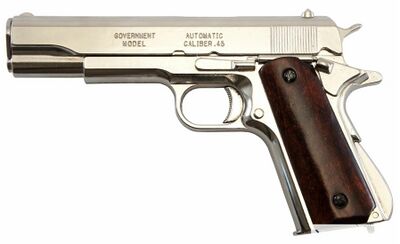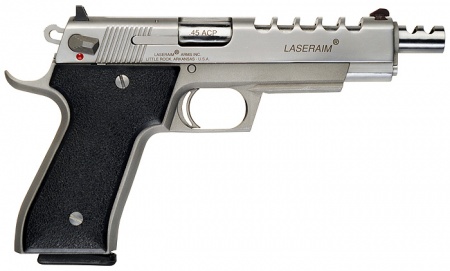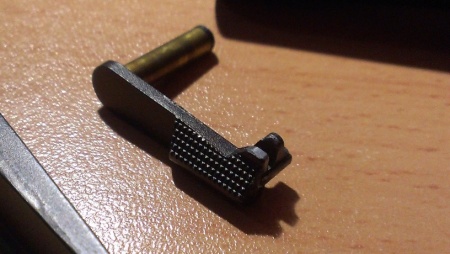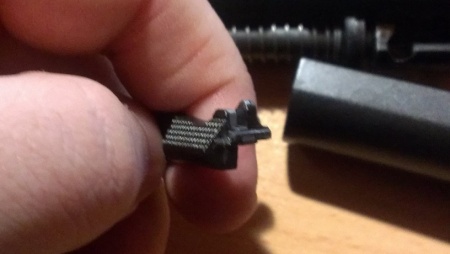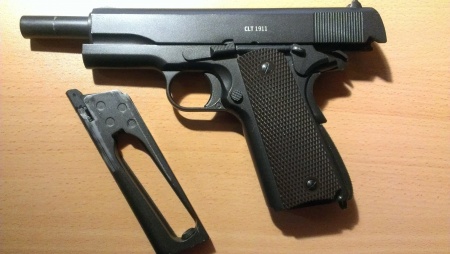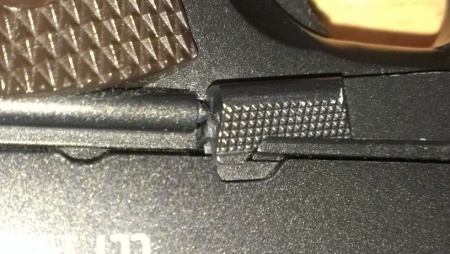| If you have been locked out of your account you can request a password reset here. |
Talk:M1911 pistol series
Additional Variants
Screen Used
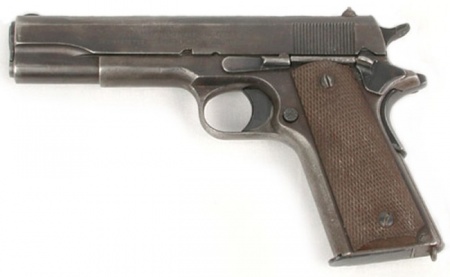
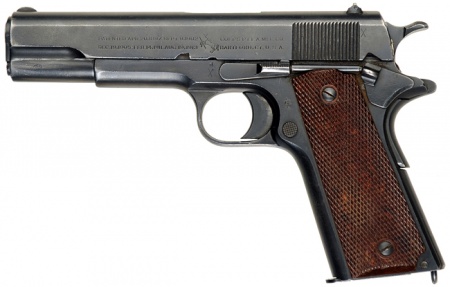
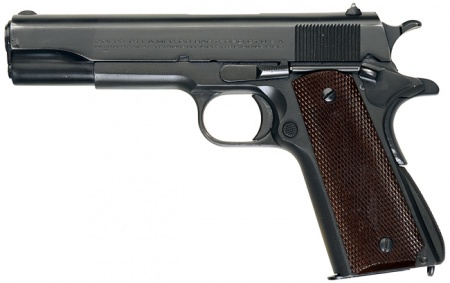
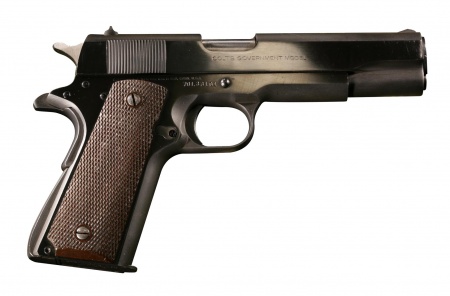
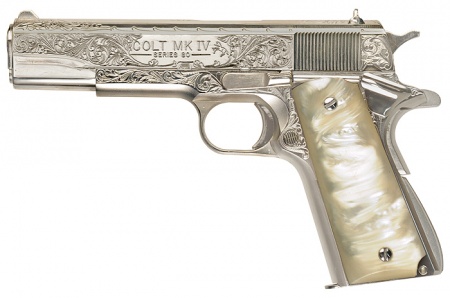
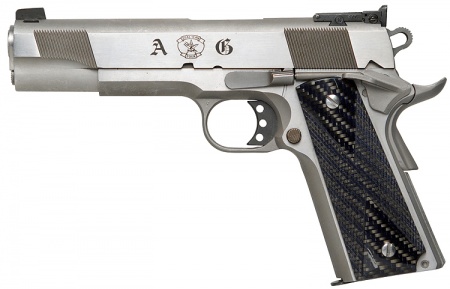
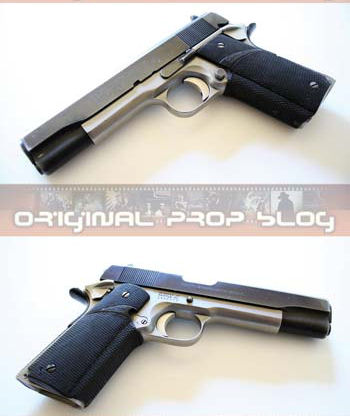
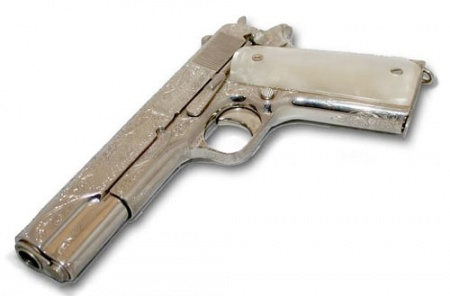
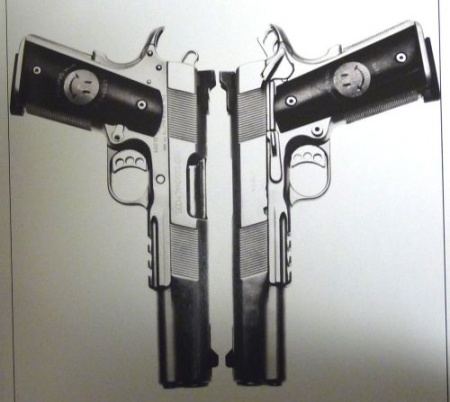

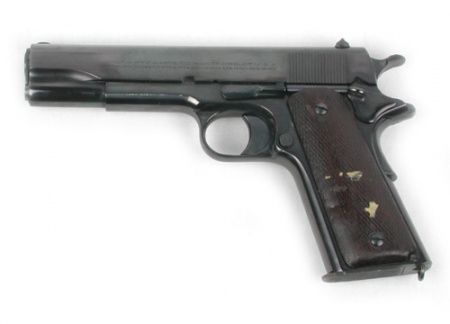
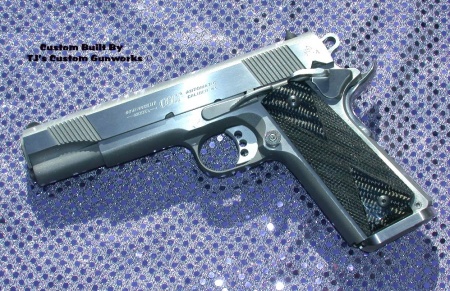
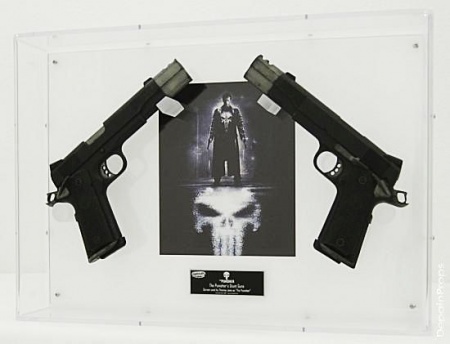
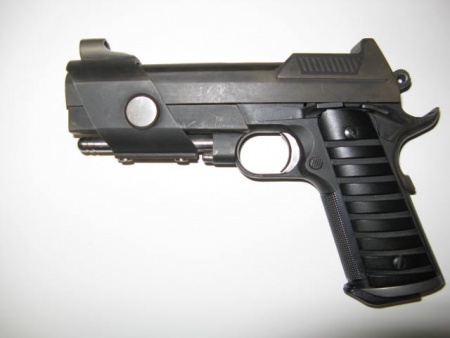
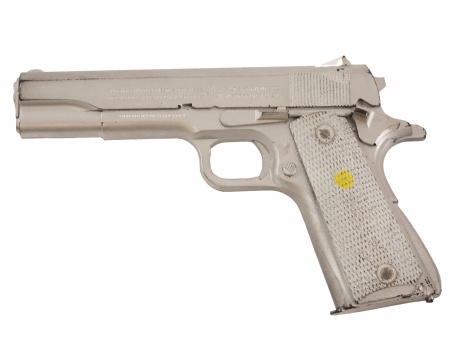
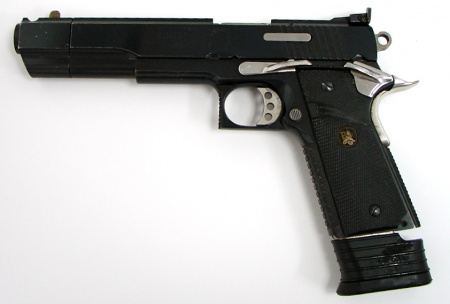
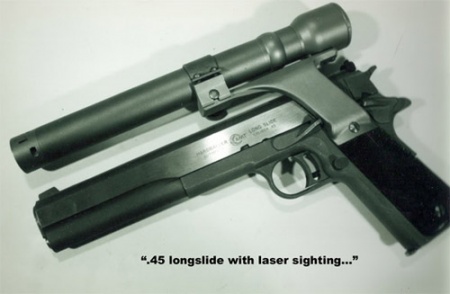
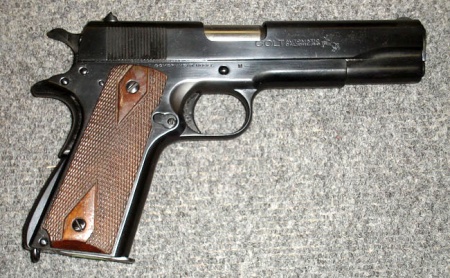
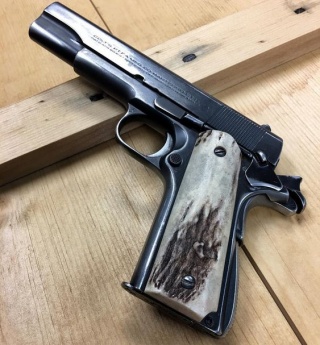
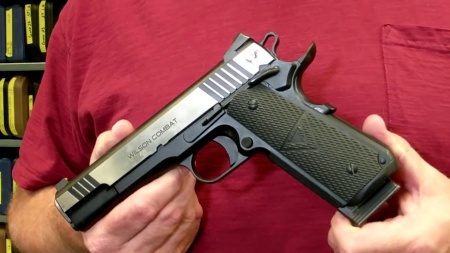
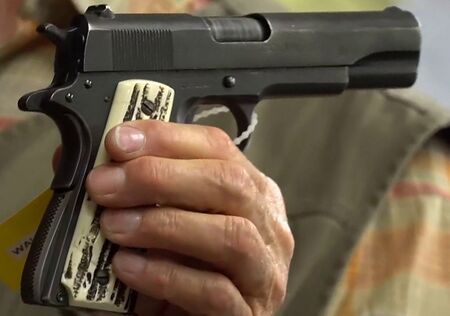
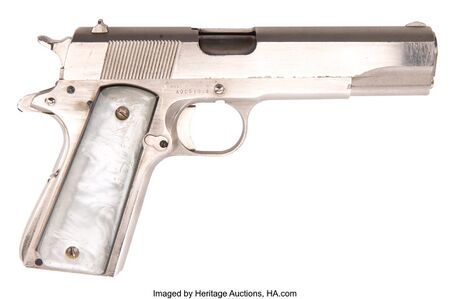
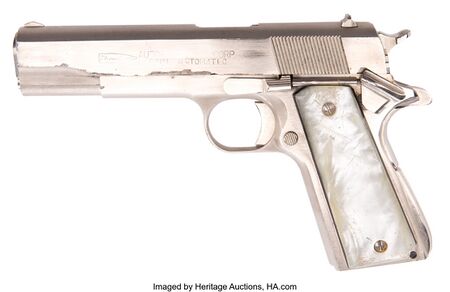
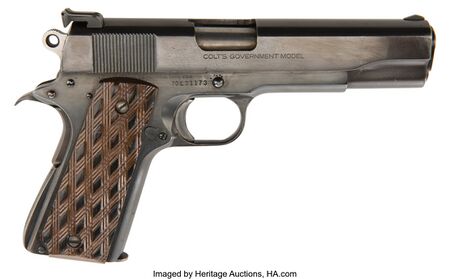
Other Variants
Colt
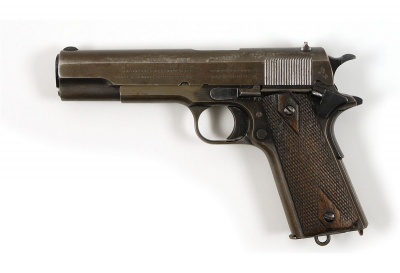
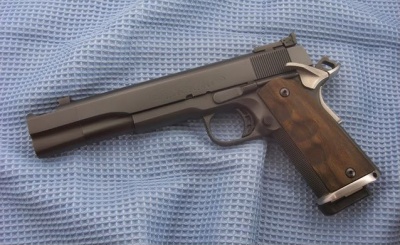
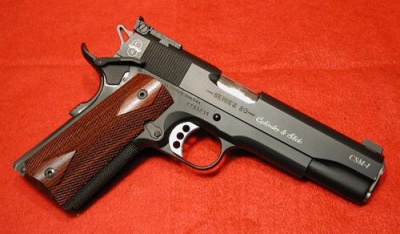
Smith & Wesson
Taurus
Others
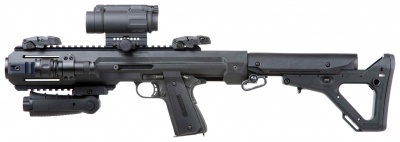
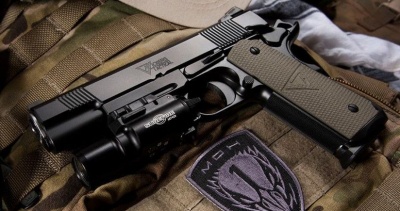
Photoshopped Variants
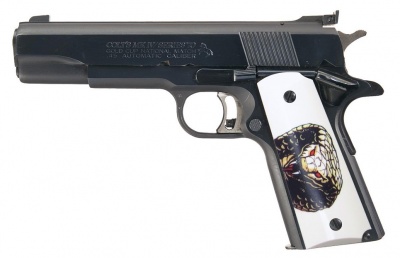
Machine Pistol Variants
Airsoft/Blank-Firing/Non Firing Variants
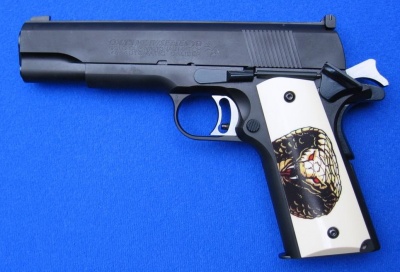
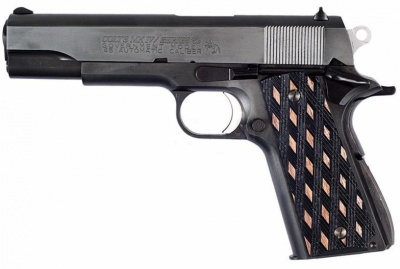
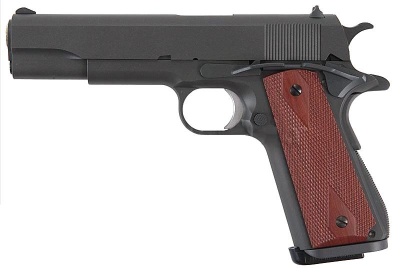
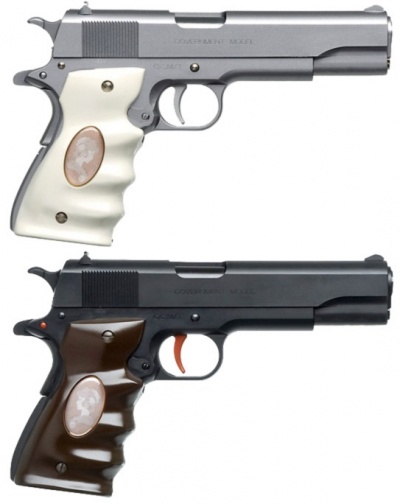
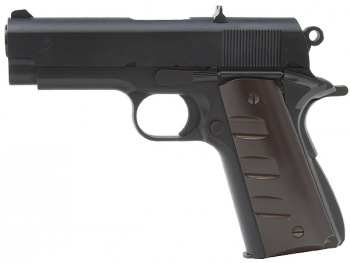
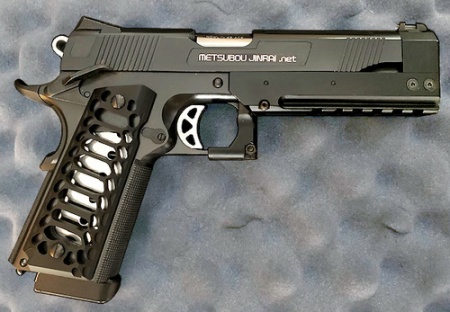
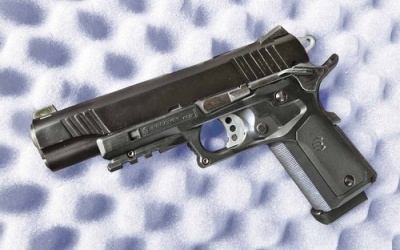
Discussion
Video game appearances of this pistol series
Why is it that the "Video Game appearances" tables have a column named "Passwords"? I don't think it's for passwords to unlock them, because to my knowledge very few video games actually have a password system to unlock weapons. Wouldn't it make more sense to have a "Notes" after the "Mods" section where certain pertinent but miscellaneous information can be written, such as what copyright-infringement-avoiding name it goes under in the game, or whether it is chambered in a non-standard caliber?
I'd like this cleared up. Oh, and someone needs to include a note saying that "mods" is short for "modifications/customizations for the weapon," not "downloadable modifications to the game itself."--Mazryonh 06:20, 23 February 2010 (UTC)
- I agree. Frankly I think both the "Mods" and "Passwords" sections can go, since the latter is pointless and the former's purpose can be adequately served by "Notes". --MattyDienhoff 15:17, 13 March 2010 (UTC)
Colt Government Model Section
With regard to the following sentence:
"Aside from Colt selling the M1911A1 to the US military, the gun was also sold under the name "Colt Government Model" to the civilian market, and called the "Pre-Series 70" guns today."
First, the Colt Government Model was introduced in 1912, and as such, it was originally in the M1911 configuration. When the U.S. Military switched to the M1911A1 configuration in the mid 1920s, Colt began manufacturing their Government Models in the M1911A1 configuration as well. So early Government Models parallel the military's M1911 configuration, while later Government Models (after the mid 1920s) parallel the military's M1911A1 configuration. Additionally, not only pre-Series 70 guns are Government Models. Series 70 and Series 80 guns are both Government Models. In fact, Colt still makes the Government Model to this day in various configurations.
With regard to the following sentence:
"For IMFDB purposes, this can also be referred to as an M1911A1. In this manner, there is no need to list film, television, anime, video games in this section."
It is sloppy to refer to a Colt Government Model as an M1911A1. "M1911A1" is the U.S. Military designation for a particular type of gun, and most of them were not even made by Colt (Remington Rand [the typewriter company] made most of them). I can see referring to a gun as an "M1911 type" or "M1911A1 type" if the manufacturer can't be determined, but when you simply type "M1911" or "M1911A1" you are referring to a U.S. Military contract pistol.
On top of that, the pictured gun in the Colt Government Model section is not even a "Pre-Series 70", it is a pre-enhanced Series 80 Government Model.
--MaximRecoil 21:44, 22 October 2009 (UTC)
- So it's like how we don't call it the Beretta M9, we call it the Beretta 92FS. -Gunman69 03:52, 23 October 2009 (UTC)
- With the M9 vs. 92FS situation, it is next to impossible to tell the difference between the two onscreen, unless there is a closeup allowing one to read the markings. In such cases I would say, if a civilian character is using the gun, it is probably intended to be a 92F or 92FS. If a military character is using it, it is probably intended to be an M9, regardless of what the actual prop is. I would assume that most—if not all—movie and TV props are actually 92Fs or 92FSs, because I don't believe that actual M9s have ever been made available for civilian sale.
- With the M1911 or M1911A1 vs. the Colt Government Model (or other brands of 1911-type guns), it is usually possible to tell the difference onscreen without being able to read the markings. For example, the Colt Government Model does not have a lanyard loop. Most M1911A1s were parkerized, while no Government Models were parkerized. When dealing with more modern Government Models, there are even more differences. For example, starting in 1950, Government Models started coming with a full-shelf thumb safety; while all M1911[A1]s had partial-shelf thumb safeties. Also at this time, Government Models started being given a finish with polished flats and matte radiuses, while blued and Du-Lite (similar to bluing in appearance) M1911A1s had polished radiuses and brushed flats or entirely polished (depending on the manufacturer and/or time of manufacture); and of course the more common parkerized M1911A1s were simply all matte.
- Additionally, the newer Government Models as mentioned above have narrow hammers with polished sides left "in the white", and polished chamber hoods also left "in the white". Many M1911A1s had wide-spur hammers, and the ones that had narrow hammers were fully finished (no polished "in the white" sides) and they all had fully blued barrels, including the otherwise parkerized ones (no polished "in the white" chamber hoods).
- Most of the Government Models you see onscreen from the early 70s to the mid-to-late '80s were actually 9mm versions, though they were usually representing a "forty-five" onscreen. This had to do with reliable functioning with readily available 9mm blanks. Colt introduced the 9mm version of the Government Model when they introduced the Series 70 in the early 1970s, and the 9mm version of the CGM had a lowered ejection port (while the .45 ACP version still had the standard military style ejection port). With the introduction of the Series 80 Government Model in 1983, the .45 ACP version also got a lowered ejection port. No M1911[A1] had a lowered ejection port.
- I'll give an example. In the show Magnum, P.I., his gun is blued with polished flats and matte radiuses; polished "in the white" chamber hood and hammer sides, and a lowered ejection port. It is clear from looking that the gun is a Series 70 Colt Government Model chambered for 9mm (though it was always addressed as a "forty-five" in the show's dialogue); and is definitely not an M1911A1. Recently the gun came up for auction and is now in the NRA's National Firearms Museum, and it has been confirmed that that is exactly what the main prop gun was (serial # 70L33101 to be exact).
- --MaximRecoil 21:58, 23 October 2009 (UTC)
Primary M1911 description
Who wrote this? The historical paragraph (on the background of the M1911) implies that the M1911 was replaced by the U.S. Military AFTER Operation Desert Storm (1991) which is not true. The Beretta M92 (M9) was already approved and adopted by 1985.
Well for a period of time both the 1911 and M9 were in use by the U.S. military,therefore just because the M9 was in service does'nt mean it replaced the 1911 by that time, and for awhile soldiers actualy got to choose which weapon they prefered :o Leadback
The Beretta M9 officially replaced the M1911 in 1985. They still used the M1911, but they weren't buying anymore. They simply phased them out over the years. Now there are some units in the US military that still use the M1911. The M9 is really only used by conventional military nowadays. For example, the Navy SEALs don't even use the M9 or M1911 anymore. They have the H&K MK23 Mod 0. Which is a purpose-built USP .45. I've even heard of some SEALs using the Ruger Mk. II. It's a .22 target pistol with an integrated silencer on it.
Soldiers were never given the choice to choose. They were given the M9, but many didn't like it. It was big, many could not shoot it accurately, and lots contested the effectiveness of the 9x19 round. Lots of people I work with were in the military around the time of the switch, were given the M9, hated it, and decided just to keep carrying the M1911. It wasn't until they were given an official order that they were forced to carry the M9. And even there, there were times when they went back to the M1911s the military had stored up. For example, out in the deserts. The magazines the military bought were junk, got sand in them, and jammed. The M1911 functioned perfectly. Same thing is happening over there now.
wrong. Special Operations soldiers are given their choice of a sidearm( and assault rifle). 1stSFOD-D has been using 1911s since foundation. infact Larry Vickers (Nighthawk Customs) has worked very closely with Delta Force. Nighthawk 1911s are being used by Delta. 2- the Seals in Vietnam started out with the Ruger Mk II Suppressed. and know one still used the HK MK23. it was fazed out years ago because of how bulky it is. SEALs use the Sig Sauer P226 or USPs. but that is still a generalization. because all SOF have a choice in sidearm Dirtdiver6421 00:20, 7 July 2010 (UTC)
Para-Ordance
Shouldnt these guns get their own page? Sure they are a 1911 varients, but their made by a totally different company.The Winchester 00:38, 25 February 2009 (UTC)
- Yeah, but they're 1911 variants. This is the M1911 pistol series page, and they are 1911s. That's why they are on here. - Gunmaster45
- I would prefer the Para Ordnance series of pistols have their own page due PRIMARILY to the fact that the Paras have a whole slew of different calibers that other M1911 makes and models don't have MoviePropMaster2008 06:40, 11 June 2009 (UTC)
What calibers does para have that other 1911 manufactures do not have?--Spades of Columbia 01:22, 7 July 2010 (UTC)
On the main page, the LDA entry claims that some of the LDA models were made DA/SA with an exposed hammer, but that isnt true is it? I thought all the LDA were Double Action Only, with the exposed hammer simply for aesthetic reasons? -MissySummers-
- Well this is FINALLY happening! Para-Ordnance 1911 Series. --Zackmann08 02:11, 16 June 2012 (CDT)
The M in the page title
Correct me if I'm wrong, but isn't the M in the page title incorrect? These are Colt 1911s (or 1911a1s, etc.), not Colt M1911s, unless referred to by US military nomenclature, just the same way that a Beretta 92f is an M9 only to the US Army and a SIG Sauer P228 is an M11 only in USAF terms. Just because it's the model of 1911 doesn't make it an M1911, any more than a '67 Shelby GT500 is an M67 Shelby GT500.YourMessageHere 08:09, 1 April 2009 (UTC)
- No. The Colt pistol was formally adopted by the Army on March 29, 1911, thus gaining its designation, M1911 (Model of 1911). Only examples or prototypes prior to the year 1911 would NOT have the M designation (which is extremely rare). Between the years of 1907 and 1910 the Colt pistol was constantly being modified and re-designed to win the Army's trials for adoption of a new handgun. The gun was only mass produced AFTER winning the Army's pistol trials. The Beretta 92FS was already famous world wide and was commercially available as the 92F/FS for YEARS before the Army adopted it. Every 1911 design came AFTER the M1911 (aka Model of 1911) so it is the correct nomenclature. MoviePropMaster2008 07:20, 10 June 2009 (UTC)
Using "1911" to refer to any and all pistols based on the M1911 design has only been popular for about fifteen years. Prior to that, the vast majority of such pistols were Colts, and were usually called "Colt .45s", even if they were pistols made by wartime contractors like Remington Rand. Those commercial guns that weren't made by Colt, as made by Vega, Randall, Federal Ordnance, Essex, etc., were called "clones", as they were generally close copies of the Colt. When makers started adding previously "custom" features to production-line guns, and branching into areas that Colt hadn't, a new name was needed, and "1911" became popular. The problem that I have with the various names on the site is the mixing of military and commercial designations; a gun cannot be a "M1911A1 Government Model", as M1911A1 is a military designation, and Government Model is what Colt has always called the civilian version of the "M" military pistols. Colt has made M1911s (1912-circa 1924), M1911A1s (circa 1926-1945), and Government Models (1912-date), but you can't mix or combine those names without confusing the issue.
Caliber question
I thought I would ask permission before making this change considering how important this article is: in the specifications category the caliber is listed solely as .45 ACP. I was wondering whether or not that should be changed to include .380 ACP, .38 Super, 9mm, and .40 S&W?
No, since the ORIGINAL Colt M1911 is .45 ACP Caliber, it should stay like that, since copies of the M1911 maybe have different calibers those should be put on the "copy" section
Agreed --User:PunisherDave
M1991 Series
I was wondering: what exactly is the difference between the 1911 series and the 1991 series? -Gunman69 17:18, 19 July 2009 (UTC)
Colt introduced (announced) the M1991A1 in 1991 as a sort of economy version of the Government Model, resembling the military M1911A1, and with the serial numbers picking up where the military gun left off after WWII. The gun was made in that form until about 2003, at which time the finish was changed to polished blue rather than matte blue, and the black rubber grips replaced with checkered wood.
- I heard a guy explain on youtube that 1991 got "extra safety feature" which blocked firing pin movement entirely when trigger was not pressed; allegedly this modification appeared after a incident involving police officer accidentally killing suspect while snapping him with the gun. However, this modification somehow managed to eject firing pin from the slide during decocking so only few people liked it --Cover72 21:59, 20 January 2010 (UTC)
- The YouTube guy doesn't know what he's talking about. The Colt M1991A1 did have the Series 80 firing pin safety, but this was introduced on all Colt Government Models in the early 1980s when the Series 80 version replaced the Series 70. The modification has never caused any problems, aside from perhaps complicating the trigger pull slightly, making it a little more difficult to achieve a good "trigger job". Also, the Series 80 parts are easily removed (and normally a few other minor things are done), and the gun will function just fine, in the same manner as a pre-Series 80 gun. The Series 80 firing pin safety wasn't prompted by any specific accidental police shooting. The only thing a non-Series 80 1911-type gun can accidentally shoot due to the lack of a firing pin safety is the ground. In other words, if a non-Series 80 1911-type gun is dropped from a significantly high height (6 feet or so I believe) directly onto its muzzle, the firing pin can continue forward with enough inertia to dent the primer, thus firing the gun (into the ground of course).
- It is too bad that Colt went to the trouble of designing the Series 80 modifications back in the early '80s, because the remote risk of accidental discharge as I described above is more easily solved by simply using a titanium firing pin (rather than the usual steel firing pin) along with a different weight firing pin spring. Since the titanium firing pin weighs less than a steel one, it has less inertia, and a 1911 so-equipped will pass the drop test just fine. In fact, Colt now uses titanium firing pins on their Series 70 Government Models that they started reissuing several years ago. If Colt had thought of the titanium firing pin idea back in the early '80s, they wouldn't have had to make any actual changes to the legendary 1911 design (changes which annoyed a lot of people), and they might not have lost so much of the 1911 market.
- Now, about the M1991A1: it went through a few different incarnations, but it originally was simply an economy version of the Series 80 Colt Government Model. Instead of the polished blue finish of the Government Model (polished flats and matte radiuses), it had an all-matte blue finish. It also had really cheap plastic grips that didn't fit well (they fell short of the bottom of the grip frame by about 3/16"). It also had a big, ugly rollmark on the slide, with "M1991A1" emblazoned in huge block letters. Finally, it came with a flat mainspring housing and a long trigger (both plastic), which was like the original M1911 (pre-M1911A1), which was ironic considering it was named M1991A1. --MaximRecoil 09:13, 17 December 2011 (CST)
Terminator 2
It was my understanding that the 1911 used in the film was a custom Colt frame with a fitted Detonic slide. Was it a combatmaster slide? 65.29.239.251 09:33, 13 March 2010 (UTC)
blank firers / K911
I've added/moved blank firing Kimar 911 to the bottom of page as told by MoviePropMaster2008 ("Non-firing replicas of the M1911 belong on the bottom of the M1911 page. Thanks.")
But I wonder, shouldn't there be an entire sub-category of blank firers (with K911 being sub-section of this) in order to distinguish blanks from the real ones? It might look confusing this way. And also, I made multiple photos of K911 for what I thought would be it's page here including disassembled weapon photo, so perhaps these unused ones might be deleted? --Cover72 21:46, 20 January 2010 (UTC)
Strayer Voigt Infinity
This gun is using a frame from STI, they call that frame the 2011, it's double stacked. And is made from steel and polymer.
- are Strayer Voigt Infinity custom built guns? or just have alot of models? Rex095
The modular frames look exactly like those used by STI. http://www.sviguns.com Don't know if they collaborate or something. They (SVI) have more optional grips than STI.
Both companies reside in Texas.
Does anyone know the mag cap for a Strayer Voigt Infinity in 45acp? - captain snikt
Police service pistols
Before the 90s were American Police ever issued the M1911, or were they're only given to the FBI and SWAT team?
- Some regular state/county/municipal departments might have used a 1911 as a standard duty-weapon before semiautos came into heavy use following the eighties, but I imagine that's a very low number. I certainly don't know of any specific departments myself offhand. Not that many departments use 'em much today. As a 1911 generally was considered a large pistol with a fairly powerful round it wasn't considered easy to use and handle by regular officers. Same general reason why departments in older times stuck with .38s over .357s - The .357 was generally considered too powerful for standard-duty officers. As such, most police departments used 9mms when they first went to automatics in the eighties as there were few semiauto calibers with lower recoil impulse and power at the time than .45ACP.
Some other police units might have used 1911s when it suited them - Homicide detectives in our county's police dept. carried 1911 type pistols, though I don't think that was the county's standard sidearm for uniformed officers. StanTheMan 02:04, 11 April 2010 (UTC)
- There's another reason, besides caliber, that the 1911 wouldn't have been too popular in the old days - it's a single-action. Before DA-only became more acceptable (i.e. Glocks), most LE departments preferred handguns that were SA/DA. Almost all police revolvers used prior to the 1980s, like the S&W Model 15 and 19, or the Colt Python, were single- or double-action. This bias continued into the 1980s when a lot of departments started adopting the Beretta 92F and the 3rd Generation Smith & Wesson autos. Now that Glocks have been around long enough, DA-only is finally becoming the standard. But SA-only is pretty much a no-go to any LE agency, and that's the way it was even before the 1980s. -MT2008 02:30, 11 April 2010 (UTC)
Isn't Glocks SA-only? The firing pin is cocked by cambering a round?
Would a Smith and Wesson Model 39 or 639 or Colt Commander be more acceptable for police use back then?
- To MT, that's a good point as well. SA weapons do require a lot of training and familiarity to operate effectively and safely, and as such, again, weren't considered practical for regular police officers either. Very good to point out. If I'm not mistaken, that's one of the main reasons why the 1911 fell out of favor in the Armed Forces as well - the fact they required extensive training and familiarity to use and carry safely. DA weapons are easier to train and operate with. Very true.
As for the Glock question, no, Glocks are actually DA only.
As for actions - In a Single-Action (SA) firearm, the hammer must be manually cocked to a firing position prior to pulling the trigger. Just like revolvers of the old west. Double action firearms will both cock and release the hammer when the trigger is pulled. SA/DA firearms use double-action by default, but feature an externally accessible hammer to allow single-action style firing (by cocking the hammer back and then pulling the trigger). Modern revolvers are perhaps the simplest examples of this.
DAO (Double-Action-Only) firearms only fire by double-action as they don't have an accessible hammer for single-action cocking. Such as Glock and various other semiauto pistols.
So if you have empty casing in the chamber, an pull the trigger several times, you would hear a loud click every time because the firing pin would be cocked every time? That's what happens in a DAO gun. If not, it's a SAO.
And on the last question, yes the Smith 39/59 pistols were used by police departments back then. Illinois State Police used the 59 back in the 60s/70s if I remember my Jane's Gun Recognition book correctly. StanTheMan 05:07, 12 April 2010 (UTC)
- Correction, Glocks are not DAO. They fire from a half-cocked position. When you dry fire the gun, the hammer falls and must be recocked by racking the slide, it does not cock by double action springs. That's why the have a slightly heavy trigger pull, they are half cocked, and are brought to full cock and dropped by pulling the trigger. - Gunmaster45
- Bah, how did I miss that.. StanTheMan 20:05, 24 October 2010 (UTC)
- Correction, Glocks are not DAO. They fire from a half-cocked position. When you dry fire the gun, the hammer falls and must be recocked by racking the slide, it does not cock by double action springs. That's why the have a slightly heavy trigger pull, they are half cocked, and are brought to full cock and dropped by pulling the trigger. - Gunmaster45
i thought glocks were striker-fired?
I think I read that Tacoma, WA police carry 1911s as standard issue service weapons.
I read on another forum that the LAPD authorises 1911 varients to officers, however they have to go through an intense training program to be authorised for it and they have to re-qualify ever few months too. --cool-breeze 16:30, 28 March 2011 (CDT)
Yes. A Glock is a "striker-fired" weapon so technically it is not either double action or single action because a glock doesnt have a hammer but instead releases the firing pin inside the slide. However if you were going to have to compare it, Single Action would be the closest term. Because the firing pin is "cocked" when the slide is racked and then the trigger only releases it and firing the round. Additionally a Glock does not qualify as a double action because it in no way cocks anything with the trigger. The trigger on a Glock can not be pulled again without cycling the weapon, whereas on a gun that is a double action the trigger can be pulled and the hammer actuated multiple times without cycling the weapon. -Peejn8r
Versus modern pistols
One thing I've noticed about this pistol is that almost everyone loves it, as though it were the best, most versatile handgun ever made. But really, what makes this thing, almost 100 years old now, any better than any modern pistols? Really, modern pistols can fire the same rounds, bigger clips, better design, picatinny rails, etc.--Zblayde 21:54, 21 April 2010 (UTC)
Familiarity, accuracy, ease of getting parts, feel, simplicity (yes I know there are designs that are simpler, but for what this pistol is, it is simple), many different makes and models of the 1911, modularity, traditionalism. There are many makes and models of the 1911 style that have the same features as many modern "wonder guns". Want more ammo? Get a Para Ord P14, ditto for DA, and DA/SA. Want a 9mm/ 10mm/ etc? there are many types of 1911 platform pistols ranging from .22lr to .44 Magnum. A quote I heard about the 1911 a few years ago is "It's like a '32 Ford Hotrod, its cheap, reliable, powerful, fun, and is easy to make it your own. Just don't think you'll get much mileage out of a tank of gas." Now tell me can you put custom grips, barrels, sights, slides, frames, triggers, hammers, finishes, safeties, slide releases magazines, etc etc etc on a Glock, XD, SIG, Beretta, etc? Maby a few of those, but at what price, and can you do it all? -Ranger01 08:51, 22 April 2010 (UTC)
- Really, modern pistols can fire the same rounds, bigger clips, better design, picatinny rails, etc.
- Funny, several pistols I can think of that fit that criteria are little more than updated 1911 pistols. StanTheMan 20:08, 22 April 2010 (UTC)
"bigger clips"
- Fail. I believe you meant Magazines. The Wierd It 21:28, 22 April 2010 (UTC)
ya Unless your talkin about a Mauser broomhandle (which you're not) I would prefer if you said magazine instead of clip
- Actually, that's another thing I'm questioning. Really, what is the difference between the detaachable box magazines and clips? I mean, clips hold bullets for easy loading, right? SO wouldn't modern detachable magazines be classified as clips too?--Zblayde 20:17, 6 May 2010 (UTC)
- Simplest way I can put this - a clip loads a magazine. The magazine is what the gun feeds from - NOT THE CLIP. It just so happens that on some guns, the magazine is affixed to the weapon (the M1 Garand and the Mauser, for example). Thus, users have to use clips to reload them. On, say, a M1911 or an M16, the magazine falls out, thus allowing the user to swap in a new one when needed. A magazine could hold a clip, if so designed...but that particular road is one-way only. --Clutch 20:47, 6 May 2010 (UTC)
- Actually, that's another thing I'm questioning. Really, what is the difference between the detaachable box magazines and clips? I mean, clips hold bullets for easy loading, right? SO wouldn't modern detachable magazines be classified as clips too?--Zblayde 20:17, 6 May 2010 (UTC)
- The "clip vs. magazine" distinction is something that really needs to be clarified, and one of the reasons why I asked for the "general information" section in the first place. Hopefully someone can make a good article there showing the various type of bullet clips and why they should not be confused with magazines. By the way, revolvers when not loaded manually use bullet clips. --Mazryonh 05:03, 7 May 2010 (UTC)
considering that this page is dedicated to the 1911 which is generally made in .45 does anyone else find it somewhat stupid that our military and most police departments are using handguns that have been known for their lack of stopping power. there are better handguns out there that hold a generous amount of .45 ammunition anyway. for example the Nighthawk FLX holds 12-14. the HK USP/HK45, and the Infinity handgun line are double stacked. and even if most .45s hold 7-10 isnt that enough in most scenarios. 7 .45 slugs does the work of at least 20. Dirtdiver6421 00:26, 7 July 2010 (UTC)
Its the same reason that police used the .38 Special for so many years even after the .357 came out. Politics, logistics, ability to handle the round, etc etc... -Ranger01 20:30, 7 July 2010 (UTC)
- With regard to caliber, police need rounds that can penetrate car bodies, doors, walls, etc. .45 rounds are not known for penetration. Also, while the .45 round is more effective against soft tissue than 9mm and .40 S&W rounds, anyone who tries to claim that 7 .45 rounds can do the work of 20 9mm or .40 rounds is completely dillusional. Watch ballistic test videos. A .45 slug entering the body does more damage than a 9mm round entering the body. If you try to claim that one .45 wound is more damaging than 2 9mm wounds with any decent grouping than you clearly have no understanding of physics or human anatomy.
But the fact remains with a 9mm you dont want him dead in the half hour it will take for him to bleed out. you want him dead NOW. with the .45 hes going to feel it. he aint gunna get back up. with the 9mm he might just keep firing.
- Depending on shot placement. A 9mm slug to the heart or any of the major arteries surrounding it will cause death within several seconds. The same is true of a shot to most areas of the skull. .45 does have increased lethality over 9mm, but that degree of superiority has been greatly exaggerated.
Yeah but a 9mm can pass through a person and keep going, a .45 doesn't. I would imagine you wouldn't want those two 9mm rounds going through a person and hitting an innocent bystander. --cool-breeze 16:28, 28 March 2011 (CDT)
It all really comes down to preference. Honestly a body shot with any round is not guaranteed to kill or stop anyone. The only thing guaranteed to immediately incapacitate someone is to severing the brain from the rest of the body. Recoil is also a big factor. If you cant shoot it it doesnt matter what you carry. People and police departments have to find the weapon that will work best for them. Personally I like the .45 and I own a 1911. The most important feature on the 1911 for me is its thinness with the single stack mag. Honestly I think my Sig 229 .40 kicks more violently and is harder to shoot than my .45. I know a lot of people who do not like the .45 and much prefer their 9mm because they are better with it. -Peejn8r
Modern 9mm JHP and .45 ACP JHP in ballestic gel create near equal wounds. I can post reference links if anyone wants them. The whole thing about magazine capacity isn't really a problem as 99% of the time, only three shots are fired at most. Even with police, most of the time, no more than 3 rounds are fired.
Carry what guns suits you best, whether its a .22LR or its a .45 ACP. Once I turn 21, I plan on getting a SIG 1911 with a 4" barrel in .45 ACP but for the time being, I have to stick with my XD40.--FIVETWOSEVEN 22:01, 11 October 2011 (CDT)
Variants NOT listed with any film/TV/game appearances
- I've taken it upon myself to remove several listed variants that had no list of anything that they've appeared in. Guns posted that didn't say they were in anything - Not one movie, TV show episode, video game, nothing. A couple of which I don't think have appeared on anything and seem to have been put up just for the hell of it.
Now I know we have a lot of 1911 variants on the page, but the page is not intended to show/describe every variant of 1911 ever made, but only those that have actually appeared in something, as quoted by some of the admins. I just find it a bit annoying to have to scroll down the page and see numerous 1911 pistols that have nothing listed under them (Again, with some looking like they were just added for the sake of being there), and I'm sure I'm not the only one.
Anyway, clearing said sections out now. If it seems like an unusual or otherwise noteworthy variant, I'll add it to the 'additional variants' section below. Bottom-line, if it ain't actually been in anything, don't add it, no matter how cool it is or whatever. If it has been in something, then next time, don't half-ass - If you're going to bother with the effort of putting it up in the first place, do it 100% and say what it's appeared in. Thanks. StanTheMan 03:18, 5 June 2010 (UTC)
Kimber
in the Kimber Warrior section it is listed as "Warrior II", which is wrong, the Warrior is built to full military specs and never got the "II" desinated saftey system...so it is just a Warrior because kimber only puts the II on the models they put their special saftey on.--Spades of Columbia 19:39, 7 July 2010 (UTC)
Controversy igniter
I am fully aware that what I am about to say will probably ignite the greatest firestorm of controversy this site has seen in a while. I have fired several 1911 pistols and found them to be a good, solid design. That said, it doesn’t change the fact that I think this is undoubtedly the most overrated firearm in history. Throughout the entire gun community there is the consensus that this is the absolute greatest thing ever conceived by the mind of man and anyone who says anything different is a blasphemer. Again, I am not saying it is a bad pistol, I just don’t think it is best (I won’t say what my top choice is for fear of causing even more indignation to come my way). Though even if it were the undisputed best pistol design around, I still don’t think it would be so significantly greater than other designs as to warrant being the object of the worship and masturbatory fantasies of every gun enthusiast in the world as it currently is. That’s my two cents, I await the fallout.
- I smell a troll.--PistolJunkie 17:18, 27 July 2010 (UTC)
I'd say he's not because he seems to explain his point. At least his reasoning isn't 'this gun sukzz' BeardedHoplite 17:42, 27 July 2010 (UTC)
- My main reasoning is that the weapons are predominately single action only, which necessitates that they either be carried condition three (which makes the pistol slow to bring into action), or condition one (which many consider unsafe). The double/single action and double action only systems have become omnipresent in most modern combat pistols for good reason. Additionally, while a generally reliable design, many other pistols have surpassed 1911 models in ruggedness and reliability. Another thing that I find odd is the vast variety of weapons that are claimed to be “1911s.” For instance, I have seen subcompact, double action only, double-column “1911s” in many calibers other than .45acp. At this point the only common feature between these weapons and the original Colt 1911 design are a loose aesthetic resemblance. The internal mechanisms maybe similar as well, but many other pistols share a far greater functional similarity to 1911s yet do not bear the moniker. At what point does a gun cease being a “1911” and become something simply trying to cash in on a famous name sake?
It is human nature to emulate successful designs in the hopes of getting a piece of that pie, especially in the modern business world. Less-refined terms for this behaviour include "jumping on the bandwagon" or "riding a gravy train." It's nothing new now in the firearms industry, what with all the AR-15 variants, Glock knock-offs, and (of course) countless "1911-type" pistols around. What defines a "1911-type" pistol is really matter of personal preference.
I would, however, agree that it's foolish to fetishize a type of firearm or a firearms manufacturer just because of its track record or Public Relations budget. There is no such thing as the "perfect" weapon in the real world--every design involves tradeoffs, and that's even before you include the "human factor." Designs can always be improved. What matters most is what you can use the most effectively in a consistent manner. And if you can't, then you ought to get yourself another weapon or train more.
Speaking of "best pistol ever," I remember how H&K tried to label their 4.6x30mm pistol as "the Ultimate Combat Pistol," but it got unceremoniously cancelled, because of "inadequate ballistics in a handgun format." So much for "Ultimate Combat Pistol"--now it joins the legions of "Useless Cancelled Pistols" that came before it. Perhaps it could have had a chance if it were a machine pistol instead, dubbed the "MP7 UltraComPact," in essence an MP7 PDW in handgun format. --Mazryonh 00:34, 30 July 2010 (UTC)
- What I would like to know is what is it about the 1911 that supposedly makes it the best. I've heard people say it is the greatest pistol ever for more than a decade yet never explain what specific features or advantages it has that make it so good.
You should head on over to the forum and ask that question: "What makes the M1911 pistol so great compared to everything else, and when does an M1911 stop being one and start being a pistol just pretending to be one?" I'm sure there are more people there who could answer your questions better than what you could get here. --Mazryonh 22:24, 30 July 2010 (UTC)
What makes the 1911 the "best"? There are many reasons for the following it has. I am of course referring to the original 1911A1 model, not the double stack nor double action variants. For one, the single action trigger is extremely easy to train with and use by a lot of people. Second, it has redundant safety systems in place. Even with the manual safety off, it will not fire unless the grip safety is fully pressed, though this safety system is seen by a few as a con of the design. Third, it utilized a single stack design. That coupled with the angle of the grip is a very comfortable for a majority of the people. The degree of the grip angle was chosen because, for a lot of people, it is a natural point meaning that one could close ones eyes and bring the pistol up and have it pointing directly at the target. Fourth, it fired the .45 ACP. The .45ACP is a proven manstopper especially when compared to the other rounds utilized at the time of its adoption and until the development of reliable hollow point designs. Lastly, I would argue that compared to many other designs, such as the Mauser C96, Luger,etc..., the 1911 was easily field strip as the pieces of the pistol were designed to aid in the stripping down of the firearm. Compared to todays plethora of firearms, the 1911 is no longer the only pistol to chamber effective rounds or reliability. Why is it still popular then? Because some people still favor the 1911 design. Overrated, I don't think so. There is a reason why it is still chosen over other designs. Is it the end-all-be-all of pistol design? No, I would say it isn't. Anyway, from everything I've read, personal experience, and research that is what I have come up with. GaBoy45 21:15, 4 August 2010 (UTC)
- Everything you have described establishes that the gun is a good design, perhaps the best gun around when it first came out, but does not explain it's enduring following. The grip may be confortable for many people, but that is far too subjective to explain why so many people (with so many different hand sizes) still favor this gun. It's single stack magazine make it a confortable target and practical concealed carry weapon, but the limited capacity it offers can be a death trap in a combat weapon (which many still claim the 1911 is the quintessential example of). The .45 ACP is a great round against soft targets, but does not offer very good penetration or long distance acuracy. And with the isistance on reliable "Soldier Proof" weapons in most of today's militaries, many modern pistols are more reliable and easier to strip than the original 1911s. I don't deny that the 1911 was most likely the best pistol in the world when it came out and for a few decades after, but I don't think it still warrents that praise anymore, yet almost every gun Television show, magazine, website, etc. seems to constantly proclaim its supremacy.
To answer your first point. The single stack, thin handgrip is easily usable by people of differing handtypes. You say its subjective but isn't how something feels in someones hand subjective? For example, the M9/Beretta 92FS has a thick grip. Bigger hands have no problem with the grip but smaller hands do. The slim 1911 grip can be used by big hands or little hands. The grip angle is something else that many people find comfortable. You second point that you made was the single stack "death trap". You say that the single stack is a liability. But capacity isn't everything. 7+ rounds of .45 ACP is good. The .45ACP has a well known reputation for one shot stops. The 9mm of the Beretta 92 or Glock 17 does not have that reputation. As for the .45ACP, it is not meant to penetrate body armor, neither is the standard 9mm, but it is accurate over long distances. There are very few pistol rounds that are meant to penetrate body armor of vehicle armor, which is what I think that you are getting at. If you draw a pistol in a combat zone, you are already in deep trouble or in a position where a high capacity is not needed, i.e. MP's. Anyway, a pistol is not meant to be accurate at long distances so the point is moot. As for the "Soldier Proof" weapons, that is just a cheap way out of training soldiers correctly, as they did with the A2 model of the M16. A milspec 1911 is just as reliable as newer designs. One such argument is that the 1911 was only tested for 6000 rounds with no failure before cleaning while Glock for example is tested at 30,000 rounds. What soldier won't clean his sidearm after 6000 rounds? What battle involves firing 6000 rounds out of a pistol? If you can't see why the 1911 design is praised and still being used then I can't help any further. The 1911 design has many good points that apparently many people still find better than other designs, and many still find the 1911 a proven and effective design.GaBoy45 22:52, 4 August 2010 (UTC)
- Apparently I wasn't clear when I rebutted you last time. The single stack is confortable for people with small hands yes. However, people with larger hands, and even some small handed people, have no problem with thicker grips and so the capacity limiting single stack serves no purpose. The grip angle is a completely subjective feature and so it is imposible to argue that one style is better than another. What matters more is simply what one is used to. You are right that 7-9 rounds of ammunition and 6000 rounds before cleaning is more than adequate for most applications, however my point wasn't that the 1911 is bad (it is a good weapon) but simply that there are better guns out their. 7 or 8 rounds may be enough for most encounters, but having 12-17 rounds and being able to fire 30,000+ rounds before cleaning is an advantage, whether or not one will utalize those features often. Also, when I referenced penetration I had things like doors, walls, and car bodies in mind, not armor. The .38 Super cartridge was specifically developed because the .45 could not penetrate car bodies effectively. Your previous post all focuses on arguing that the 1911 is an adequate combat pistol which I completely agree with. My whole point is that the features you mentioned do not make it the best pistol around. When I first began this conversation I stated that the 1911 is not a bad gun, simply that with all the pistol designs that have emerged in the past century it is no longer the greatest pistol in the world, yet nearly everyone in the gun community (yourself clearly included) still claim it is for no other reason than people like its grip (which is subjective), its caliber (which is used in many much modern modern firearms), and its history (which can easily make it a favorite gun but can not be used as justification for it being the best).
- "You are right that 7-9 rounds of ammunition and 6000 rounds before cleaning is more than adequate for most applications"
- "Before cleaning"? What do you think; that it will malfunction on the 6001st round if you don't clean it? The gun is as dirty as it is going to get after a few hundred rounds. When you've fired a gun 6000 times in a row without cleaning and with no malfunctions, that means that when the gun finally does malfunction it won't be because it is dirty; it will most likely continue to function properly until something breaks.
- "but having 12-17 rounds and being able to fire 30,000+ rounds before cleaning is an advantage, whether or not one will utalize those features often."
- Just so you know, the M1911 didn't malfunction on the 6000th round. It didn't malfunction at all. They stopped after 6000 rounds because that is how many rounds they had decided beforehand would be adequate for a test. Any gun that can fire 6000 rounds without malfunctioning can most likely fire indefinitely without malfunctioning, until something breaks. And keep in mind that the M1911 did this 100 years ago, being built out of the relatively poor grades of steel of the day (steel was greatly improved after WWII, even though no U.S. military M1911 or M1911A1 ever got to take advantage of it, because none were bought after WWII). Also, those things you mentioned are potential advantages. A potential advantage that isn't used at all is not an actual advantage, obviously.
- 30,000 rounds is overkill for a test. Most people will never fire anywhere near that many rounds through their handgun (especially without cleaning), and even if they did, who would want to trust their life to a gun that has 30,000 rounds worth of wear and tear on it? --MaximRecoil 13:18, 17 December 2011 (CST)
You were arguing the design flaws but it is the design that is one of the big reasons it has such a following. Since you are arguing one view against the other. Why a lot of people think that it is the best. The design is one reason, history is another, the round it fires is yet another reason. I actually don't think it is the best I was merely stating the reasons that it is popular and why people say it is the best. I like the Beretta 92fs for its grip and certain design attributes and the Glock 21sf for different reasons. Would I object to using the 1911 in combat. No. Would I use the Beretta 92fs in combat with FMJ ammo? Not if I didn't have to. With HP ammo, I wouldn't hesitate to use the Beretta. But even your view of other designs being better is subjective. If a pistol, rifle, shotgun, etc...is reliable and fires a moderately effective round then it is a good design. What makes it the best is subjective as far as it goes. What one pistol may be best at is what makes it worst at something else. There is no way to objectively define the "best" just what is better than something else.GaBoy45 00:17, 5 August 2010 (UTC)
- I agree. I don't have any gun in mind that I think is indisputably better than all others. The features I pointed out I did so to demonstrate that in certain aspects the 1911 is inferior to other disigns, not that said other designs are the perfect weapon. Every design is a give and take of different features. Because of this, my main complaint was a pervaisive belief that the 1911 is unquestioningly the greatest gun ever (I have heard that phrase Verbatim in many issues of Guns & Ammo). Is it better in some aspects than double-collumn, double-action 9mm pistols? Yes. Is it better across the board? Absolutly not. I apologize if at any point I have come across as confrontational, it is just that I have heard so many people assert the 1911's complete supremacy so many times that it has really gotten on my nerves and I wanted to know what others thought.
Google "1911"...then google any other gun...now tell me which one has the most varieties...which one has the most after market parts and pieces for the specialist. Which one has the most surplus parts. Its so popular and so famous because if you wanted to you could make one look like no other one or you could make it look like that one in your favorite movie. Not only that but all the diffrent calibers from 45cal to the awesome and unbeatable 10mm. Plus they are sexy as hell. To sum up you can basically have a beautiful, functional, all steel combat pistol in your choice of caliber and its going to feel like a dream in your hands.--Spades of Columbia 00:48, 5 August 2010 (UTC)
- The madness of crowds surely knows few bounds--just look at how the various bottled water companies manage to make a killing selling what is essentially tap water, because people will do often do things just because enough other people tell them it's a good idea. Then again, I suppose the "cult following" that some pistol-types have over others is due in part to the following facts:
- Pistols are rarely if ever primary combat weapons anymore, with the exception of law enforcement.
- Few people who routinely carry pistols have to regularly use them in gun battles against opponents who are earnestly trying to kill them.
- Therefore there aren't many occasions for most pistol-carriers to test their assumptions in the most revealing field of all--life-or-death situations. So depending on your circumstances you can go a lifetime without ever putting the hype in the harsh light of real return-fire. I'd bet on the M1911-type (the "pure" single-stack .45 ACP M1911s) pistols selling so much mostly because of its hype and history, and that it is, at its heart, a serviceable (though hardly optimal) weapon. Given how many clones there are, however, I really must wonder what would have happened had Colt become the sole copyright holder for this pistol type--would we see more innovation that way, or just countless clones of some other pistol type? Perhaps a more revealing, specific question would be "How does the M1911 platform compare to the Glock platform or CZ-75 platform?" That could work because all three are successful pistol types offered in multiple calibers, including 9x19mm, .45 ACP, and 10mm Auto.
- Bottom line? The "pure" M1911 works, but we can certainly do better. --Mazryonh 04:07, 5 August 2010 (UTC)
- Exactly
Ok, well answer me this then. Why if the 1911 is all hype and legend does MEUSOC still issue 1911s? Why does Delta give out a stipend to have an operator buy his own custom 1911? Why does the FBI HRT use 1911s? and LAPD SWAT? and so many other groups that use pistols? The reasons the wonder 9s came into popularity are lower recoil (marginal), size (marginal) higher capacity (less training in marksmanship), weight (long since gone by the wayside), to match ammo with other NATO countries (Military), and hype/ cool factor (civilian). The 1911 has served admirably (in one capacity or another) with few major changes to the platform for almost 100 years. The Beretta, Glock, CZ-75, etc. have been redesigned and "improved" since they came out just to try and match the 1911s in popularity, reliability, etc.-Ranger01 17:30, 16 August 2010 (UTC)
- Sure thing. How many of these operators you mentioned fulfill the conditions I mentioned above, namely that they regularly use pistols as their primary combat weapons instead of SMGs/PDWs/Rifles and often engage in gunfights with earnest, aware opponents? And other combat platforms for the .45 ACP won out, such as the Mk. 23 SOCOM pistol which won out over Colt's version. The "improved" Beretta, Glock, CZ-75 you mentioned have done so to fit consumer demand and market competition, but national armed forces aren't that commercial and competitive most of the time because of how many contracts and vested interests are running the show. I simply said that the "Pure" M1911 platform works when used, but it can be improved, otherwise the Mk.23 SOCOM wouldn't have won the OHWS program. --Mazryonh 02:05, 8 September 2010 (UTC)
- A lot of Special Forces don't even use the Mk. 23 due to its bulky and awkward size. Many Navy SEALs opt to use 9mm SIG-Sauer Pistols
H&K won the competition because they strictly adhered to all of the requirements (some of which were asinine), and they put in the best bid. When USSOCOM received the Mk. 23 they got exactly what they asked for but not what they had actually wanted. The SEALS who used it complained about how it was too big, heavy, and its cons outweighed its pros. They tried to pawn them off on the ARMY but no one there would touch them, so most of them went back to H&K. As with all things military, big brass does not listen to the guys who actually have to use the equipment until its too late.-Ranger01 06:13, 8 September 2010 (UTC)
I would like to toss my thoughts into the mix. Being a Brit getting a hold of a real firearm is harder than getting away with stealing the Popes hat, but I am an avid airsofter and I have held and fired many different types of airsoft pistols ranging from HK USPs, to Glocks, to Berettas, to SIGs. But I still go back to my 1911s to which I have 2 (I'm awaiting delivery of a third). I don't have tiny hands but I don't have big bear hands and the 1911 design feels right in my hands. I use a weaver stance and the 1911 is the best pistol for hand placement in that stance, I had an issue with the Beretta that sometimes my thumb could slip onto the slide locking mechinism and prevent slide lock. With Glocks they felt too top heavy for me, maybe it's how the airsoft Glocks are designed and it's not like that on the Real steel. I used a SIG for quite a while as that felt pretty good, but as soon as I picked up a 1911 I needed one. After a little practice I can draw, remove the safety and bring the pistol up to the target in a little under 2 seconds. Why do I like the 1911 so much? It's all about the placement, the safety is right by your thumb so when you draw it you can use one motion to bring the pistol up and deactivate the safety. I found the Beretta to be a bit of a fumbling job deactivating the safety mid draw. Why the 1911 design is still praised isn't down to some cult following, it's down to simple ergonomics, it looks great, the functionality is great, the placement of everything on the pistol is perfect. I saw someone post that they would rather be able to fire 30,000 shots and not have to clean their pistol rather than 6000. I don't know about you but if I only fired off one shot from my pistol in a battle I would still clean it to make sure nothing is going to cause a problem next time. Better to be safe than sorry. --Cool-breeze 17:19, 17 November 2010 (UTC)
I think it depends by what you define as 'best', and what you need the gun for. In my mind, if you want an M1911 variant, get a Para-Ordnance LDA. Like the P14.45, but double action. If you want a cheap, reliable, accurate semi-auto, do what everybody else does, get a Glock 17 and stop moaning. Your moaning about not people liking 7-round magazines (we've moved on to higher-capacity ones-in my mind, if armies must use M1911 variants, use Para-Ordnance's. 7 or 8 rounds plus one in the chamber is just awful, and you'll run out quickly.) is making the world of semi-auto's remain stuck in the 20th century. Embrace the future! With pistols like the Caracal, FN Herstal Five-seveN, and many other great ones, it's not half bad.
I just Google Imaged the 1911 & Beretta 92, with the former receiving 80.8 million results, and the latter receiving 1.46 million results. Sangheili1155 16:08, 5 June 2012 (CDT)
Ballester-Molina
The Ballester-Molina should not be included in the 1911 page. It's not a 1911, only the mags and barrel interchange. Internally it's based on the Star Model A, which has significant differences from the 1911 in terms of lockwork. Unless anyone objects I'm going to create a separate page for it. - Nyles
Hello there,
This is a question for the webmaster/admin here at www.imfdb.org.
Can I use part of the information from this blog post right above if I give a link back to your site?
Thanks, Daniel
Dreamworks Animation
When are you guys going to add animated films from Dreamworks like Monsters vs. Aliens and Megamind, because they have guns used by police and the military.
Just because there are guns in it doesn't mean it gets a page here. Are they recognisable as real guns, or are they stylised ones? The Wierd It 09:58, 14 November 2010 (UTC)
They are real guns in the animated films, like in Monsters vs Aliens, the soldiers used some M16 rifles to shoot at the alien, and in Megamind, the police uses rifles and pistols on aiming the villain, who is walking.
OK, I'm going to assume that you haven't read the Rules, Standards and Principles page, most notably this section. Read that, then check back. The Wierd It 19:36, 14 November 2010 (UTC)
But wait, why do we have video game pages then? Firearms in them barely resemble real ones --Jackbel 19:47, 14 November 2010 (UTC)
Ok sorry, no big deal, lets not add cartoons yet, because they have to wait.
- @Jackbel. Because in video games you can clearly identify the guns, and no the good ones do not just 'barely resemble real ones.' As a video game person you should know this, unless Australia has weird rules about depicting guns in video games. The reason cartoons are generally not allowed is because unlike anime, most cartoons have a generic silouette of a 'gun' while most animes have enough detail to be able to determine what guns was used. Think Ghost in the Shell or Cowboy Bebop.--Gunkatas 13:52, 15 November 2010 (UTC)
I don't know about Monsters vs Aliens, but I can vouch for Megamind. In one scene, Metro City PD blockading City Hall are armed with visibly-identifiable M16 rifles (which version IDR) and Beretta 92 pistols (again, which exact version IDR because it's been a while since I last saw it). I don't have the DVD or Blu-Ray to screencap it, though. Spartan198 (talk) 17:13, 8 April 2013 (EDT)
.45 Blanks
I've read a lot here that .45 blanks used to be unreliable. I was wondering when they started to become a bit more reliable and why they were unreliable? I can't find that anywhere.
I thought it wasn't really the blanks being unreliable so much as it just being easier to blank-convert a 9mm than a .45. The Wierd It 10:29, 2 December 2010 (UTC)
.45 pistols require more recoil force to cycle their actions than 9mms. Since blank rounds have virtually no recoil, .45s are much harder to convert to use blanks.
Ah right. Is there some new way of converting them now because I've started to notice that in recent years there have been a lot of films using .45 ACP versions of pistols that are also chambered in 9mm. Die Hard 4.0 for example, McClane as a P220 in .45 ACP. --cool-breeze 17:37, 2 December 2010 (UTC)
- Is it explicitly stated that the prop gun was chambered in .45? The Wierd It 21:16, 2 December 2010 (UTC)
- "Is it explicitly stated that the prop gun was chambered in .45" We have a pic of the actual screen used gun and is listed as .45 ACP. I think all newer P220s are chambered in .45, only some of the older ones were chambered in 9mm and .38 Super. Also the .45 being unreliable with blanks. I don't think it encompassed all .45 chambered pistols. I think it was only in the 1911 platform. With the 9mm being a much smaller blank and having the large ejection port made for the .45 it was easier to eject them.--Predator20 22:09, 2 December 2010 (UTC)
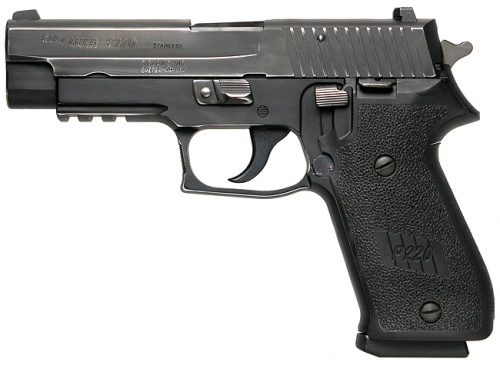
- Just checking. Especially after the whole issue with the Glocks. The Wierd It 23:54, 2 December 2010 (UTC)
Long (and detailed!)story short. For a 1911 to fire blanks reliably you must first drill and tap the barrel for a blank adapter, then taper the barrel hood, then grind off the locking lugs, and remove the barrel linkage. Once that is done, the testing for a reliable adapter and blank combo ensues (you may or may not need to enlarge the ejection port too). I figure its pretty much the same with other pistols...-Ranger01 19:11, 2 December 2010 (UTC)
That sounds like a very complex process. I'm assuming if you do that well though the 1911 will cycle blanks as well as 9mm blanks. --cool-breeze 01:28, 4 December 2010 (UTC)
I read an article in a gun magazine a few years back about blanks and it said that it comes down to the casings used. According to the article, blanks are made from rifle brass because it has to be long enough to be crimped and still be long enough to be the length of a real cartridge. The problem with .45 acp ammo is that until recently there was no rifle brass in .45 diameter that could be used for blanks. I remember reading back when "Miami Vice" was on that Timothy La France had brass custom manufactured in .45 for blanks. -- David, 3 December 2010 (well, its the 3rd where I live)
Laseraim Series III?
So what is this thing?
It looks more like a CZ derivative than a 1911 derivative to me... Alot like a mashup of CZ, S&W, Sig, STI, etc..-Ranger01 06:51, 11 December 2010 (UTC)
- It draws a little from the S&W series (namely the safety) and CZ-75 (in terms of grip shape), but technically it is a M1911 derivative, they just didn't make many of them.--PistolJunkie 07:15, 11 December 2010 (UTC)
Used to see these in tv shows during the late 80s. the later model was the first pistol I ever saw with an integral accessory rail on the dust cover, although that was in a catalog. David. 11 December 2010
- Dust cover? What are you talking about? MoviePropMaster2008
I don't know what else to call it, it is the part of the frame extending in front of the trigger guard. I have seen it, in print referred to as a dust cover. David.
- THIS Laseraim was photographed for the Haunted (2002) page since it was used in an episode. If you guys read the Haunted (2002) page, for which this IMAGE was originally shot for, the description says: Laser Aim was yet another manufacturer who built ported .45 ACP pistol based on the original M1911 design, but incorporating elements of the BHP and the CZ-75 into a new design. The unique feature of the Laser Aim was a hole cut out of the trigger guard ahead of the trigger to mount a laser. Since the production ended for this pistol, smaller lasers with better battery life have been invented. By the late 1990s LaserAim had gone out of business and had sold their patents to AMT. Hope this sheds some light on the piece. It is a new weapon influenced purportedly by M1911, BHP and CZ designs. :) MoviePropMaster2008
Ah, that explains it. Could have saved myself about 2 hrs of google searching if I'd looked up the image uses hah.-Ranger01 23:13, 11 December 2010 (UTC)
MEU(SOC) Pistol...
...has been given a new designation, M45. [1] Spartan198 02:24, 4 January 2011 (UTC)
We also need a better image for it, but I can't find one I can't be sure isn't an Airsoft gun. The Wierd It 19:04, 5 January 2011 (UTC)
The big problem is there is no single model that is the M45/ MEUSOC Pistol. The "M-45s" in service are a mix and match of Kimbers, Springfields, Colts, etc. The "M-45" is a set of specs that any pistols built for MEUSOC have to comply with. There are SOME retrofitted M1911A1 pistols that were done by USMC Armorers at Quantico, but they are going to be near impossible to differentiate from the M1911A1 they were built from. Here's a good thread from AR15.com (dear lord its hard to say that haha) about the M-45 MEUSOC pistol variants. http://www.ar15.com/forums/topic.html?b=5&f=49&t=86667 -Ranger01 08:46, 9 February 2011 (UTC)
More proof of the M1911's greatness
According to the news, the M1911 is now the official state gun of Utah! This is kind of cool, since John Browning lived in Utah, and it's just in time for the great .45's centennial anniversary. 74.192.58.206 21:16, 19 March 2011 (CDT)
Happy 100th Anniversary to the Colt M1911!
Happy 100 years of service M1911! Thank you for providing some of the most nastiest knockdown power available to the armed forces and for providing an eternal name of badassery in motion pictures!
Here's looking forward to 100 years more! --ThatoneguyJosh 15:40, 29 March 2011 (CDT)
My favorite semi-auto is the 1911. I've had affairs with others but I always come back to a good ole Colt .45. I didn't understand why until I did some research and figured out we shared a birthday. Still saving for an anniversary model... USGIMar29 19:40, 2 September 2011 (CDT)
9mm 1911s
I'm not sure if this is an appropriate question to ask but could anyone recommend some good 9mm 1911s? I live in Australia and the maximum calibre you can get without doing competition shooting is .38 or 9mm rounds. --GunEnthusiast 07:07, 21 July 2011 (CDT)
Kind of late, but if you're still there GunEnthusiast, the only one I can think of off the top of my head is a Para-Ordnance P18-9, otherwise known as Hitman's gun (well, in the film.). The reason 9mm M1911 variants are so far and few between and rare is that .45 ACP was invented for the gun, and despite no living American being old enough to say they were born before it's creation, most Americans believe a 9mm M1911 is a sin, and that the ghost of John Moses Browning will come and haunt it's makers and buyers. I think. Anyway, the fact the P18-9 is Canadian explains it. No one complete American fully understands Canada. Alasdair.
- Agent 47's gun. Hitman is his profession, not his name. ;-) Spartan198 (talk) 17:17, 8 April 2013 (EDT)
Naming the MEU(SOC) pistol
On M1911's page (and correspondingly on pages that list the weapon) it is named "M-45 MEUSOC":
1) While calling it "M-45" wouldn't be incorrect, it should be changed to "M45" in line with other officially adopted names on IMFDB;
2) Using "MEUSOC" in conjunction with "M45" is incorrect. It is either "MEU(SOC) Pistol" or "M45 Close Quarters Battle Pistol" / "M45 Close Quarters Combat Pistol".
--Masterius 11:46, 2 October 2011 (CDT)
- Well, then go change it. ^3^ - Mr. Wolf 14:59, 2 October 2011 (CDT)
- Will be done right now. --Masterius 03:17, 3 October 2011 (CDT)
- I think they are the same pistol. I remember seeing a story about how the MEU(SOC) was reclassified as the M45 Close Quarters Combat Pistol at some point, and have also seen documents that use the term M45 MEUSOC (no brackets). What do you think the differences are between the two? I think there is some confusing as there have been various different versions of the MEU(SOC) pistol built from various off the shelf parts. There are at least 5 versions that I know of, and main fetures are as follows. 1: original version with unflared ejection port and Springfield Armoury logo behind the ejection port. 2: newer slide with flared ejection port and logo in front of the ejection port. 3: front slide serrations. 4: wide slide serrations and Novak sights, with grip safety with "bumb" at the bottom. 5: 4th version with skeleton hammer rather than Commander type hammer. You also have the ICQB which is a Kimber made pistol with a railed frame. --commando552 06:26, 3 October 2011 (CDT)
- Sorry, just realised I totally misread your original post. Though you were saying that the MEU(SOC) and M45 were different pistols. However, the term M45 MEUSOC (without brackets) is also correct. [2] --commando552 07:52, 3 October 2011 (CDT)
- I think they are the same pistol. I remember seeing a story about how the MEU(SOC) was reclassified as the M45 Close Quarters Combat Pistol at some point, and have also seen documents that use the term M45 MEUSOC (no brackets). What do you think the differences are between the two? I think there is some confusing as there have been various different versions of the MEU(SOC) pistol built from various off the shelf parts. There are at least 5 versions that I know of, and main fetures are as follows. 1: original version with unflared ejection port and Springfield Armoury logo behind the ejection port. 2: newer slide with flared ejection port and logo in front of the ejection port. 3: front slide serrations. 4: wide slide serrations and Novak sights, with grip safety with "bumb" at the bottom. 5: 4th version with skeleton hammer rather than Commander type hammer. You also have the ICQB which is a Kimber made pistol with a railed frame. --commando552 06:26, 3 October 2011 (CDT)
- Notice the presence of comma between M-45 and MEUSOC. That would indicate the listing of different designations for the weapon. --Masterius 09:27, 3 October 2011 (CDT)
- I really don't think the comma means that, but to satisfy you, here [3]. To be fair though, I have seen official documents that refer to the M45 being the MEUSOC, Close Quarters Battle or Close Quarters Combat pistol. I think this whole conversation is irrelevant however, as on looking into it, I think the M45 pistol and the MEU(SOC) pistol listed on this page are different weapons, with the M45 being a commercial of the shelf pistol made by either Colt, Sprinfield Armoury or Karl Lippard Designs. This article from the Marine Corps Times seems to back this up (this time referring to it as the Close Quarter Battle Pistol) stating that the M45 is modelled on the MEU(SOC) but will be a COTS pistol, which is currently being evaluated. For the sake of simplicity, I think the pistol on this page should just be called the MEU(SOC). --commando552 11:19, 3 October 2011 (CDT)
- MEUSCOC. Wonder what the first "C" stands for?
- It would have been so much simpler if there was website that chronicles the history of MEU(SOC) pistol. Every variant along with pictures and how they were designated (to distinguish them)... Because currently sources are conflicting. In USMC's MCB Quantico section there is an article "The Devil Dogs’ workshop". There it says M45 Close Quarters Battle Pistol is being built by local armorers. --Masterius 12:50, 3 October 2011 (CDT)
One more issue: sources vary on the year of adoption. Some say 1985[4][5], other say 1986[6][7][8]. Maybe change the part to "since the mid-1980s"? --Masterius 01:53, 11 October 2011 (CDT)
- Done. --Masterius 07:08, 13 October 2011 (CDT)
A Location of Procuring
Does anyone know where you can get one of these great airsoft movie-1911 replicas namly the stunning and slender long-slide?
The image has a watermark from ehobbyasia.com on it, so I'd suggest looking there. The exact pistol is here. The Wierd It 10:12, 14 December 2011 (CST)
Organization.
Any objections to alphabetizing this page? I think it would make a bit more sense... --Zackmann08 21:38, 6 December 2011 (CST)
- No don't do that. The M1911 and M1911A1 go first. --Predator20 21:52, 6 December 2011 (CST)
- Fair enough, I actually agree with that. But what about the less common ones. Seems weird to Kimber, Strayer, Inifinity, Detonics, Springfield, etc... What if we keep the most common ones at the top (M1911 & M1911A1) and put the rest in order? --Zackmann08 21:58, 6 December 2011 (CST)
Difference between Kimber and Colt.
In several medias, I discovered that Colt M1911 can sometimes be referred as the Kimber. Why is it so since the weapon manufacturer is Colt? And is there any difference in the mechanism of gun between the both companies? --S9771773G 21:31, 28 December 2011 (CST)
those medias are just being ignorant with their terminology. Colt makes 1911's and kimber makes 1911's...two diffrent companies that happen to make the same model. Any true diffrences in them will mostly be cosmetic in nature. The biggest diffrence between colt and kimber is that Kimber say Yonkers on it and colt say Hartford. Most people think that colt was the first and only maker of the 1911 and call all 1911's colts no matter of maker...for example someone saying "I own a colt 1911 made by springfield"...well no sir you have a Springfield 1911-A1 and colt has nothing to do with it.--Spades of Columbia 10:21, 29 December 2011 (CST)
Airsoft Colt's grips.
Maybe it's kinda stupid,but I was wondering,could I install some custom or just another grips on my.. hahaha,Marui's Colt Government spring pistol? ;) That thought came to me,cause I realised,that mine is 1:1 copy of the real one,so.. maybe,new grips would be possible to install. Littlesoldier1 16:17, 22 January 2012 (CST)
- Not sure about the springer, but you can put them on the GBB pistol. Makes the gun much lighter though, as the airsoft grips have metal weights inside them. Seems a bit of a waste doing it on a springer though, the grips would probably be worth more than the gun. --commando552 16:34, 22 January 2012 (CST)
Yeah,agreed about the price.Thanks for a useful answer.:) Littlesoldier1 16:41, 22 January 2012 (CST)
When to add here Vs own page
What makes the decision between a 1911 variant being including on this page versus having its own page? With this page getting so large seems like some of these guns could have their own page. The Star Model B has its own page, for example, while the Para-Ordnance LDA is part of the M1911 page. How is that decision made? --Zackmann08 19:13, 1 March 2012 (CST)
- The Star B while similar on the exterior, internally it isn't. From the Star Model B talk page First, these pistols had no automated grip safety, and no detachable backstrap/mainspring housing. Second, Star pistols had simplified trigger/sear design with single trigger link, and pivoting trigger. Third, external safety swiths locked the hammer, not the sear. Fourth, Star pistols featured exetrnal extractors. Fifth, as noted above, Star A Super and B Super also had different barrel locking/unlocking. The page is getting a bit big. They could be split per manufacturer. Colt would stay on this page I guess. Kimber, Para, Springfield etc getting their own. The M16 rifle page is also getting too big, it often kicks me out of it. --Predator20 19:25, 1 March 2012 (CST)
- That makes sense! Yea I've got a pretty good connection here but when it takes over a minute for a page to load, time to split them up... I like your idea of doing them by manufacturer and we can always have a See Also at the bottom. --Zackmann08 19:31, 1 March 2012 (CST)
- Maybe make thread on it in the forums. Most probably won't go for it though. --Predator20 21:02, 1 March 2012 (CST)
- That makes sense! Yea I've got a pretty good connection here but when it takes over a minute for a page to load, time to split them up... I like your idea of doing them by manufacturer and we can always have a See Also at the bottom. --Zackmann08 19:31, 1 March 2012 (CST)
Any further thoughts on this topic??? --Zackmann08 14:04, 14 June 2012 (CDT)
British M1911
I understand a series of M1911's were modified to fire .455 Webley Auto rounds. Can anyone give more information about this? Like is it suppressor adaptable? Who used it? Etc, etc.
- It was mainly used by the Royal Navy (although imagine the Army got hold of a few) and 11,000 were made from 1915 to 1916. I doubt a standard pistol can take a suppressor as it was a WWI service pistol so had no need for one but imagine it could be threaded for one, which I would not recommend as it is a relatively valuable pistol you would be messing with. I think the mags are pretty pricey as well, as they are not standard .45 ones as the .455 Webley Auto Mk I was slightly longer than the .45 ACP. An interesting fact about this pistol (to me anyway) is that it can be legally owned in the UK due to the fact that it was made before 1919 and uses a cartridge that is deemed as not readily available. --commando552 16:56, 9 March 2012 (CST)
Longslides
What is the point of such a long barrel? I mean, how does increasing its length affect the weapon's capabilities? - User: 2wingo
Longer sight radius (more accurate sight picture), (slightly) higher velocity, more weight at the front end (reducing recoil).-Ranger01 (talk) 23:58, 17 December 2012 (EST)
- What exactly is a "sight picture?" - User: 2wingo
- What it looks like when you are aiming down the sights. Sight radius refers to the distance between the front and rear sight. When this distance is short, you can more quickly align the front and rear sights, but it has the disadvantage that if you are looking through the sight at an angle, there will not be as much misalignment between the front and rear sights. Conversely with a longer sight radius, if the gun is off at an angle from your intended point of aim the misalignment will be more obvious in the sight allowing for it to be corrected. Longer sight radius on these longslides has disadvantages though, such as it taking longer to align the sights, more perceived "wobble", a longer overall length and a heavier gun. As for muzzle velocity increase when going from a 5 to a 7 inch barrel for example, it can be anywhere from only a few FPS to a 10% increase depending on the ammunition. --commando552 (talk) 19:44, 18 December 2012 (EST)
Cocking serrations
Among the improvements listed for the Colt XSE was the addition of front cocking serrations. What exactly is the significance of that? I mean, how does it improve the gun to have serrations on the front as well as the back of the slide? - User: 2wingo
- It makes it easier to do a brass check. See here. --Funkychinaman (talk) 23:50, 17 March 2013 (EDT)
An interest metaphor
¿Did you notice that in the first episode of the fourth season of Boardwalk Empire, The character of Richard Harrow burries his Colt 1911, and also in the first episode of the fourth season ofThe Walking dead, the character of Rick Grimes finds a Colt 1911 in the dirt? The interest thing about this metaphor is that bot men burried and found the pistol after a long selfjourney of their past actions, and future decisions. The Colt represent thier inert rage and violence, terrible feelings, but human emotions. The fact is that they are going to try to repress their vengace, but the course of the narrative will make a breaking point in their judgment.
- Deep--AnActualAK47 (talk) 21:38, 12 September 2015 (EDT)
Regarding 8-Round Magazines
7 and 8-round 1911 magazines can be the same size, the difference is the springs. The slam pads are not part of the magazine or a thing to hide that the mag is protruding, it's an optional part to have on the magazine https://www.sladestreettactical.com/index.php?rt=product/product&path=67&product_id=660. Without it, it is flush just like a 7-round mag.
Here's a Chip McCormick 8-round mag compared to 7-rounders http://www.curtrich.com/07magazines09_914s.jpg
So if you see a 1911 in a game (that at least takes place post 1990, not fully sure when flush 8-rounders came into being) that holds 8 rounds in a flush magazine, it is not incorrect. Mr. Wolf (talk) 18:53, 8 December 2015 (EST)
- Well damn that crazy, i'll keep it in mind--AnActualAK47 (talk) 03:30, 9 December 2015 (EST)
Stealth-1
Since it appears to be built from a Detonics CombatMaster, shouldn't it be in the same entry? Spartan198 (talk) 09:31, 11 February 2016 (EST)
- I don't really think so, as I believe that the only parts that are from the Combat Master are the slide and barrel, and both of these have been chopped down to make them even shorter and modified in other ways. Wouldn't hurt to mention the modified Combat Master slide in the description though. --commando552 (talk) 12:50, 11 February 2016 (EST)
Tanfoglio Witness 1911
quote:
Tanfoglio Witness 1911
Tanfoglio Witness 1911 Co2 4.5mm – The Colt Government 1911A1 Replica. This is a modified airsoft KWC M1911 distributed (mostly in Europe and America) by Cybergun under the name of Tanfoglio. "Real-life" Tanfoglio never made 1911 style firearms.
Tanfoglio actually did make a 1911 pistol. It was called the WITNESS 1911, but it was never released for the US market. http://www.tanfoglio.it/uploads/catalog/images/grandejpg78.jpg
M1911 slide release tugging?
Most pistols have the option of either thumbing the slide lock lever to release the slide or pulling the slide all the way back to let the gravity do the rest. There are pistols like Luger P08 or Walther PP that do not have the decidated slide release lever and force you to pull the action instead. Then there's the M1911, which has what I believe is called the "slide lock plunger". There are two of these plungers between the slide release and the safety lever. In the latter's case it's obvious, and the slide lock plunger seemingly prevents it from jumping and locking prematurely due to recoil. So my question is: does it prevent the slide from releasing when you "tug" it all the way back? I own a Gletcher CLT 1911, an air replica (I am well aware that it isn't a 100% genuine representation of a real firearm, so please try to refrain from calling me a dumbass) which does not release the slide on "tugging" even without an empty magazine. It is also made with a "bulge" for the plunger to grab onto it, unlike the real slide lock levers. And I repeat my question: can the M1911 series' slide be released by tugging? Is it wrong to be depicted in videogames as releasing on tug? DJ_von_CAHEK (talk) 06:00, 27 October 2017 (EDT)
- Pretty sure that you can release the slide stop by pulling it back like on most pistols. It isn't gravity that makes the slide stop fall by the way, it is that pulling the slide back pushes the stop down with the angled front face of the notch. Other pistols have a spring that pulls the slide stop down if you retract the slide slightly without an empty mag fitted, I don't actually know if there are any that rely purely on gravity, I can't imagine that would work very well. I also do not think that the only purpose of the plunger for the slide stop is to prevent it jumping due to recoil, but also to try and prevent the slide stop from walking out during firing which causes the whole gun to lock up. By saying "It is also made with a "bulge" for the plunger to grab onto it, unlike the real slide lock levers" do you mean that your gun has a notch on the back edge of the slide stop lever the the plunger locks into? If so, there are some guns and aftermarket stops that do have this in real life or the back face has a vertical groove on it, they do this to try and further prevent the slide stop from walking out. Contrary to what some say, 1911s aren't perfect. As to why it doesn't work on your replica, I don't really know. When you pull the slide back does the front of the slide stop hit a ramp at the front of the notch or will it not retract that far? --commando552 (talk) 13:00, 27 October 2017 (EDT)
- This is the Gletcher CLT 1911, a pretty authentic air replica - weight, safeties, blowback and all that. This is the slide stop bulge I'm talking about - it even makes a loud click when activated manually. The slide moves only 2mm from "locked back" position and the bulge keeps the slide stop from releasing the slide. Every googled "m1911 slide stop" image has a flat surface. DJ_von_CAHEK (talk) 14:54, 27 October 2017 (EDT)
- Ah, now I see what you mean. I have never seen a real 1911 slide stop that is like that, any I am aware of are either flat or have a recess of some sort in the back. I assume that this might be something to do with the magazine spring being weaker than a real one so perhaps it is not strong enough to push up the catch reliably so it effectively falls off of a shelf when the follower hits it to make sure it goes properly in place maybe? Also, it looks like the slide stop is not going anywhere near as far into the notch on the slide as a real pistol. This has the double issue that firstly this is possibly the reason the bump is necessary, as it is only just catching on the corner so would potentially be pushed back down without being held in place, and secondly it means that the stop goes nowhere near the angled front surface of the notch, which on the real 1911 is the thing that pushes the slide stop down when you rack it on a full mag or no mag. --commando552 (talk) 21:49, 27 October 2017 (EDT)
- The slide stop is pushed all the way up with an empty magazine. So, I assume, on real M1911s, due to this "bump" not existing, the release on tug is possible, like with other pistols. DJ_von_CAHEK (talk) 06:32, 28 October 2017 (EDT)
- Ah, now I see what you mean. I have never seen a real 1911 slide stop that is like that, any I am aware of are either flat or have a recess of some sort in the back. I assume that this might be something to do with the magazine spring being weaker than a real one so perhaps it is not strong enough to push up the catch reliably so it effectively falls off of a shelf when the follower hits it to make sure it goes properly in place maybe? Also, it looks like the slide stop is not going anywhere near as far into the notch on the slide as a real pistol. This has the double issue that firstly this is possibly the reason the bump is necessary, as it is only just catching on the corner so would potentially be pushed back down without being held in place, and secondly it means that the stop goes nowhere near the angled front surface of the notch, which on the real 1911 is the thing that pushes the slide stop down when you rack it on a full mag or no mag. --commando552 (talk) 21:49, 27 October 2017 (EDT)
